












The key higher education facts for students thinking about university
Preparing for university
4 | How to research universities and courses
5 | On the fence about university? What are the benefits?
7 | Reasons to consider university
8 | What is fair access and widening participation?
10 | University support for care experienced and estranged students
11 | University support for students with special educational needs and disabilities University events
13 | Making sense of university events
16 | What are the benefits of attending a university event?
17 | Tips for preparing for large university fairs
19 | How to prepare for a university open day
20 | What to expect at a university open day
22 | Why evaluation is important and why do we do it?
Support with your university choices
23 | A guide to the different types of university courses
24 | A guide to part-time university courses
25 | Thinking about studying your undergraduate degree online?
26 | A hybrid approach to making your university choices
28 | How important are university league tables?
30 | Interested in studying a creative subject?
31 | A student guide to studying in Scotland
32 | A student guide to studying in Wales
34 | A guide to degree apprenticeships
Financing your studies
35 | Five things EVERYONE should know about English student finance
38 | A guide to the Disabled Students’ Allowance
40 | The NHS Learning Support Fund and you
42 | A guide to scholarships and bursaries
43 | Managing your money at university
Before you apply – application support
44 | Can you get in? A guide to the qualifications universities will accept
45 | Making school and college option choices with university in mind – avoiding the road blocks
46 | Who’s entitled to additional university support through fair access programmes?
47 | What are contextual university admissions and how can they help you?
48 | A guide to university widening participation and access programmes
49 | Preparing a portfolio for a creative application
50 | Writing a stand out personal statement
53 | A guide to the university admission process and the offers you could receive
After you apply and once you start
55 | What to expect once you have a university offer
56 | Where to start with choosing your university accommodation
57 | Going to university? What happens after results day?
59 | Student life – what’s it all about?
60 | The traditional university experience – is it the same for everyone?
61 | What can you do at university that you might not expect?
62 | Preparing for university - what are student societies?
63 | Think employability – a guide to careers support at university
64 | Thinking about your future: how your degree opens up your employability
65 | Credits
This guide has been produced to support you to make brilliant future university decisions. This may be the initial decision: Is university right for you? Or the choices that might come next: where to go, and what to study?
We’ve split this into sections which are designed to support you with various stages of your higher education decision-making journey. These include, why you may wish to consider university, advice when you’re making your university choices, fees and finance support, application help, what to expect after you apply and when (/if) you start your course.
University decisions should not be taken lightly. You need great advice from your school or college, friends and family and websites like UniTasterDays.com to ensure you find the right path and have fun along the way.
To support you further, this guide features contributions from experts in higher education with fantastic advice and support to share. It has been produced in collaboration with HELOA - and we are very grateful for their support and the contributions made throughout the guide by HELOA members.
I should also add that often in the guide, we use the term ‘university’ – but it is acknowledged that not only universities offer higher education programmes. We just use the term ‘university’ as it avoids another acronym and using repeated references to ‘higher education institutions’ throughout.
The information has been produced based on the higher education system in England, and the guide was released in March 2024.
As you will see from the advert below, this guide is one of many resources at UniTasterDays, which will support your university research. Including our latest release, the Uni Guide Podcast, which is available on all streaming platforms.
Good luck with your future university choices – I hope you find this information useful in your lead up to them.
Jon Cheek Director, UniTasterDays.comResearch. A slightly daunting word often used at universities to indicate a high-level of indepth analysis within a topic. Let’s take a quick spin through some of our top tips to help you when it comes to researching subjects and universities.
First of all, there’s no right or wrong order. Some students will be course driven and others will be motivated by the university’s status and reputation. Here are a few useful ways to go about exploring the vast array of different universities and subjects on offer, in order to find the course that suits you best.
Check in with yourself
What subject(s) do you find interesting? Is there a certain subject you want to learn more about? Don’t worry if there’s no immediate answer to this, or there isn’t a particular subject(s) you feel passionate about. Try considering whether there’s a specific topic within a subject that you enjoy.
Take biology for example, you might not like the whole subject, but genetics might fascinate you as a topic. And the great thing about uni is that you can go into that level of detail; it gives you the opportunity to deep dive into niche areas.
If you’re really struggling for inspiration, you could use a process of elimination and look into all the degree courses out there that
you’ve never had the chance to explore at school or college. You can do this on university webpages, by using prospectuses and some universities even offer online subject taster sessions.
Tip from
Check out subject guide videos for impartial subject introductions
www.unitasterdays.com/ondemand
Using league tables
League tables can be a great research tool, they won’t just tell you the top ranking universities. They can also be used to find out specific information about your chosen course at different universities, such as its ranking or the percentage of students that go into full-time employment afterwards.
Your chosen university will become your second home for the next three to five years, so it’s important you feel confident with your choice. Even if you don’t move away from home, you’ll still be spending a lot of time at your chosen institution.
The best way to find out more about a university’s location is to visit on one of their open days. They’re a great opportunity for prospective students to look around, talk to current students, see the university’s facilities, visit their accommodation and visit the city or surrounding area.
You can involve as many or as few people as you want in your exploration journey, but ultimately it’s a personal decision. You’ll be the one studying that subject and attending that university every day. It has to feel right for you, and you only. Good luck on your journey!
Open days can be a dealbreaker. They’ll give you a feel for what your university experience will be like and can really help you to make a decision about where to apply. ” “
University can feel like a huge decision and can throw up all sorts of questions. Whether you’re the first in your family to consider university or simply uncertain about the investment, it’s still a big decision that requires plenty of thought. But as with any big decision, it’s best to have the facts, figures and knowledge to help you on your way. So, let’s get going.
University is a great way to further develop your academic interests in a discipline of your choice. Many degrees will also give you the opportunity to develop practical skills as a part of your degree. For example, you could gain lab skills from a science-based course, or camera and editing skills from a degree in film or media production. Throughout your degree you’ll specialise even further, meaning you could graduate as an expert in an area you love. It could even be in a topic you’d never heard of before you started your degree!
Do you have a career in mind? Some jobs require a particular degree, including jobs in
the medical field, law and certain sciences. That doesn’t mean EVERY career will need you to go to university, but many degrees are a fantastic stepping stone into many industries. You’ll also gain essential personal and employability skills, such as time management, interpersonal and critical thinking skills.
Your degree could also segue into a graduate job to help you further develop the expertise you’ve gained at university. Or, if you want to get going when building your dream career while you study, degree apprenticeships are a great and popular option among school and college leavers. They’ll give you the opportunity to gain a higher-level qualification while learning and earning on the job.
Academic study and career prospects aside, university is a fantastic opportunity to develop personally. You could end up in a new place, with new people, studying a new subject. And while this might seem daunting, it’s a great way to mature and learn about other people and cultures.
University also provides many opportunities to try new things. Maybe there’s a hobby you’d like to start or continue with? Well, university societies and sports teams will connect you with new people who share the same interests and they can really help you to settle into uni life. Get out of your comfort zone and give a few a go! You won’t regret it and you could learn something new about yourself in the process.
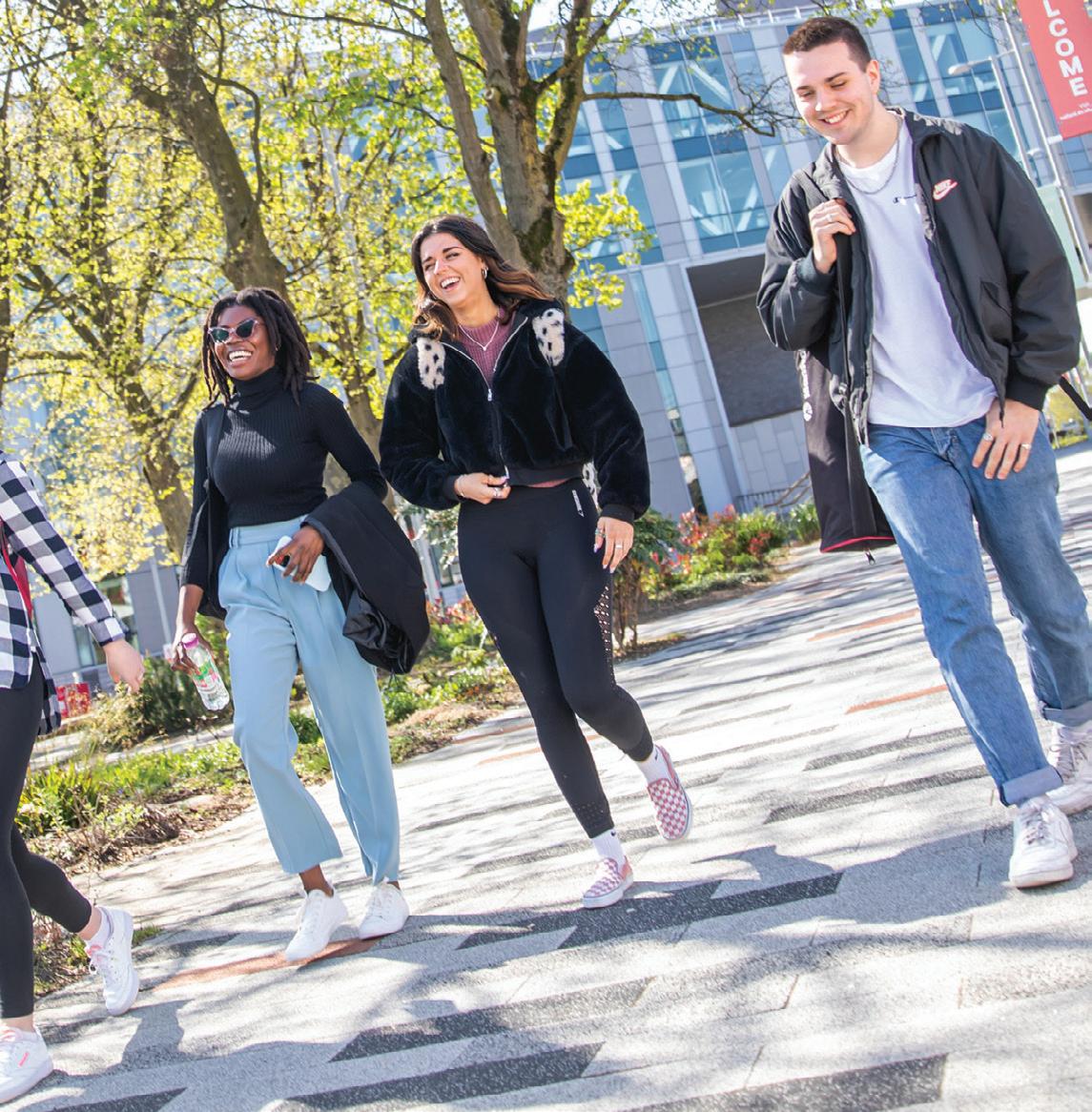
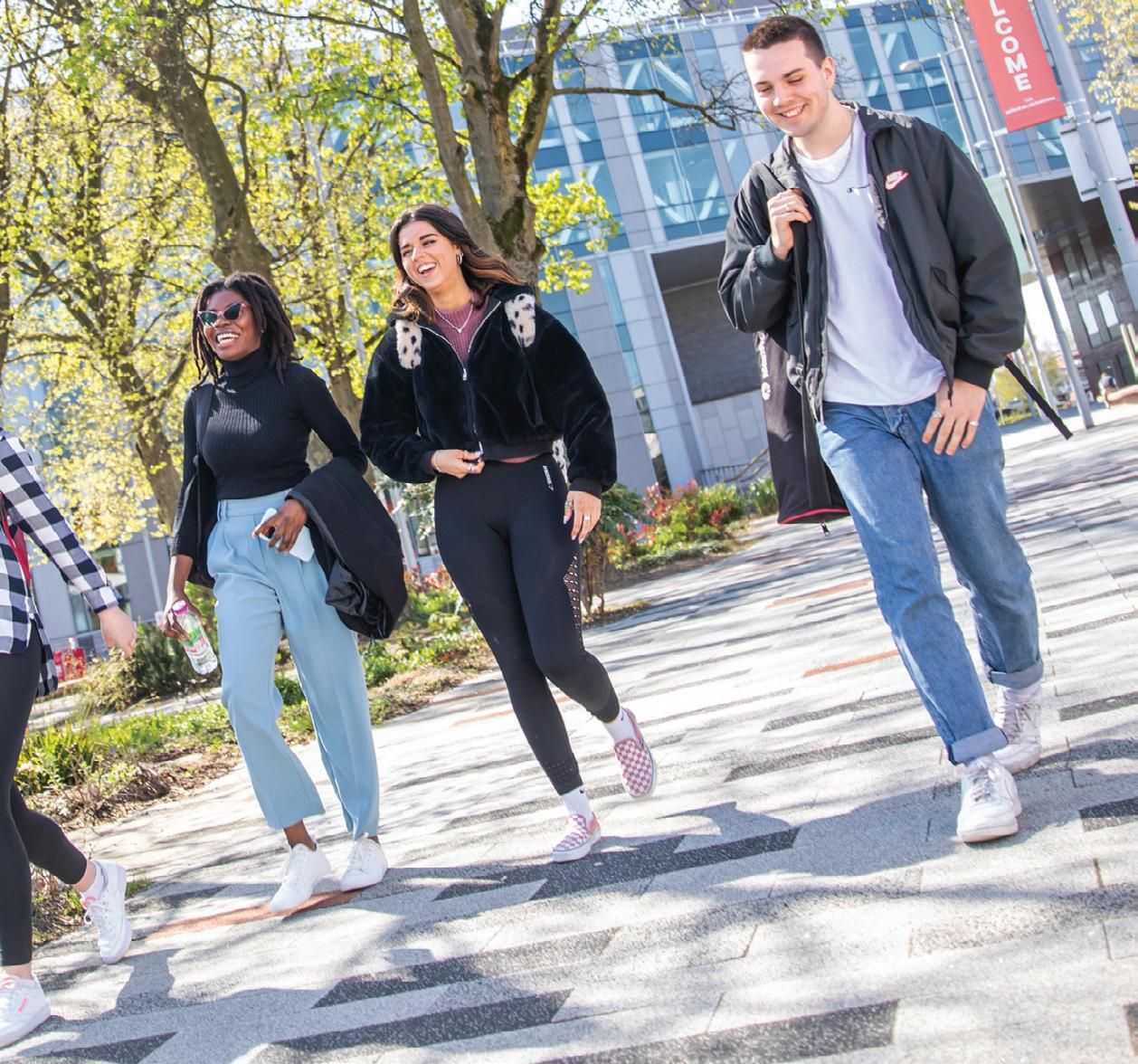
/ Dating back to 1896, we have a long history of setting our students up for future success.
/ We offer the best of both worlds – a campus-based university, based within 2km of Manchester City Centre.
/ Our campus at MediaCity sits amongst industry giants, located right in the centre of the north’s digital and media hub.
/ At the heart of our Peel Park campus sits our award-winning accommodation village –just a short walk away from all the action!
Saturday 15 June 2024
Saturday 12 October 2024
Saturday 9 November 2024
Saturday 11 January 2025
VISIT US ON AN OPEN DAY TO FIND OUT MORE: salford.ac.uk/opendays
We also have an Open Day Travel Bursary available – you can find out more on our website!
Most conversations about going to university mainly focus on topics relating to the future in terms of career prospects, employment and financial benefits. These conversations are important, it’s good to think about what’s ahead and how university will benefit you. But have you considered what personal experience you could gain, just by attending university? Here are my top four reasons to consider university:
1. To escape your parents or guardians! You’re an adult now. It’s time to spread your wings. Whether you stay at home or move out, this is your chance to gain independence, manage your finances and do things for yourself without the help of your parents or guardians. It can sound intimidating at first but, actually, it’s great to be in complete control of your personal schedule. You can do things when you want and the way you want. Just make sure that your routine is healthy!
2. Have your own F.R.I.E.N.D.S experience
Yes, I am referencing the television sitcom, F.R.I.E.N.D.S! Your university experience could be comparable in the sense that you’ll build new networks and meet a variety of other students through nights out, societies or your
course. Then there’s the people you’ll be under the same roof with. As housemates, you might cook, study and go out together. You might even be a great support to each other as you go on your university journey. Don’t worry if you chose to live at home during your degree, you’ll still make great friends who you’ll make great memories with.
3. Explore a new destination
It’s your decision whether you stay at home, live in another place in the UK or even move abroad for university. You could choose to switch it up entirely, move to nearer the sea if you’re used to urban life or swap your country lifestyle with the buzz of a new city. Either way, during your free time, there is the opportunity to explore local areas surrounding the university. Take a look at TikTok and see what recommendations or hidden gems there are. Invite your friends and enrich your social life or adventure alone to independent restaurants, shops, cultural spaces and local parks. No two regions are the same.
4. Discover new hobbies
Outside of your studies, university gives you the possibility to join societies. Most are free or cost a very low fee to join. They’re usually run by students, so there’s a strong emphasis on the student voice when it comes to managing a society. Think outside the box and try something new or continue with something you love - there’s something for everyone. You could always try a mix - why not join a sports team and a video-gaming society? The perfect balance of active and chilled.
Universities are committed to ensuring that studying for your degree is as accessible as possible, as fair access to higher education is vital in improving life opportunities for you and those around you. To do this, universities have a range of widening participation activities that you can access throughout your journey to higher education. Designed to make the application process as fair as possible, these activities will provide you with the information and support that you need before, during and after your studies.
Before you apply
Universities recognise that applying to university is not a straight forward process and that process may look different for different people. Depending on your financial, personal or ethnic background, you may face additional challenges in accessing higher education, so to assist with this, universities have dedicated staff to support students who require additional support. While the support varies from university to university, there are a range of opportunities available for you, including:
• taster lectures and workshops with academics (virtually or in-person)
• mentoring programmes with current university students
• university and national scholars’ programmes
• on-campus residentials during school holidays
• online webinars designed to support your application
• specific advice and guidance about contextual offers.
After you’ve received an offer
Once you’ve received your offers from your chosen universities, they’ll normally contact you to offer support and additional guidance to assist you with making your final choices. As part of this, you’ll be likely to be invited to an offer-holder day, where you’ll get the chance to look around the campus, meet current students and attend taster lectures for your chosen subject. For students meeting specific widening participation criteria, other support may be offered, including:
• Funding to assist with attending offerholder days
• Additional information about support services and points of contact to help with the decision-making process.
When you arrive at university Universities recognise that you may need additional support when you first arrive, as it can be a lot to take in all at once! Which is why some offer tailored induction sessions for eligible students either online or in person prior to the start of term.
There will also be lots of opportunities to meet new people and additional support to help you settle in during Welcome Week. As with all fair access and widening participation initiatives, the details of what will be offered will vary between universities, but these programmes may include:
• settling in sessions
• workshops to help with additional support areas like managing your money
• information resources to help with your studies
• careers and study skills support
• mental health and wellbeing support
• help with settling in to your accommodation
• signposting to additional financial support.
To find out more about what specific universities offer as part of their widening participation and fair access programmes, visit their websites or contact their admissions teams.

The University of Exeter is ranked in the top 15 of UK universities and in the top 10 in the Russell Group for student satisfaction.
Our Discover University website has a range of activites and resources designed to support your journey to higher education, including:
l Bookable events including our Discover University virtual conferences
l Advice on how to explore your chosen subject
l Essay competitions to strengthen your supercurricular activies
l Subject Q&A panels
l Higher Education Jargon Buster
l Advice on your application and personal statement
l Advice and insights from our Student Ambassadors
Visit our website to find out more: exeter.ac.uk/discoveruniversity
To find out more about visiting our campuses either virtually or in person, visit: exeter.ac.uk/study/undergraduate/visit

Making decisions about your future and whether university is right for you can be a challenge for anyone. For care-experienced and estranged people, it can be even more daunting and often feel like it is too far out of reach. Higher education is a brilliant opportunity that can make a huge difference, and there are dedicated members of staff at universities who are ready to support you in overcoming any barriers you’re facing.
What does care experienced and estranged mean?
You’re a ‘care leaver’ if you have been under the care of your local authority for at least 13 weeks since the age of 14 and up until your 16th birthday.
You’re ‘care experienced’ if you have ever been in care, even if you do not have ‘care leaver’ status. This may have been provided in many settings, including living with foster carers, in a residential children’s home, being looked after at home under a supervision order, or living with relatives in kinship care. You could have spent any length of time in care, at any age, and may have been adopted.
Previously, universities aimed their support at care leavers, but most universities have now extended some or all of their support to anyone with care experience.
Estranged young people are those who are not in contact with either of their parents due to an irreconcilable breakdown in the relationship, which is likely to be permanent.
What support is on offer?
Universities offer a range of support. From when a student first considers university all the way to graduation and sometimes beyond! It’s up to you to choose what support to access.
Most universities will offer support before you’ve even applied to university. It’s a great idea to contact your local university, and any you’re thinking of applying to, to see what support they offer. Pre-entry support could include:
• advice and guidance around applying to university
• a free visit to the university
• contextual offers (up to 3 grades below the standard offer)
• dedicated outreach programmes
• priority places on summer schools.
Once you become a university student, you’ll also have access to lots of additional support. This varies across universities but could include:
• help with moving costs
• arrival packs
• buddy schemes
• induction programmes
• emotional and practical support
• social events
• specific career advice
• year-round accommodation
• help paying rent e.g. reduced rent or not having to pay a deposit
• free storage during holidays
• rent guarantor schemes
Most universities offer additional financial support, on top of the support you may receive from your local authority and Student Finance England.
To find out what type of support is offered at different universities, check out Propel’s website
The most important thing to remember is that you won’t be alone. There are dedicated members of staff, like me, whose job it is to support you. There are also care experienced and estranged students all across the country right now who are achieving amazing things at university. If they can do it, so can you.
According to UCAS, every year over 60,000 students with physical and/or mental health conditions and learning differences apply to study at university in the UK. As a result, many universities have specialist teams whose main priority is to support them.
You may be familiar with the term ‘special educational needs’ (SEN), which is used in schools in the UK. Universities, however, tend to use ‘disability’ more broadly to encompass many conditions and impairments, such as those in the list included on the right hand side of this page.
Identifying as disabled gives you protection under the Equality Act 2010 and legally enables you to access support and adjustments for your impairment(s) or condition(s).
When you apply via UCAS, it’s helpful if you disclose your support needs and any impairments or conditions you may have so that your chosen universities can arrange support for you from the get-go. You can also contact your chosen universities directly if you wish to discuss your needs in more detail. ” “
Anyone who has a disability, impairment or condition that has an impact on their ability to study. This may include:
• a visual impairment
• a hearing impairment
• physical or mobility difficulties
• a long-term health condition such as diabetes, asthma or chronic fatigue
• a mental health condition
• a specific learning difficulty such as dyslexia or dyspraxia
• an autistic spectrum condition
• a neurological condition such as epilepsy or tourette syndrome
• a neurodevelopmental condition such as attention deficit hyperactivity disorder (ADHD).
Disabled Students’ Allowance (DSA)
This is a financial grant you need to apply for in addition to your UCAS application. It can help to pay for specialist equipment to support your studies, and you don’t need to repay it. Examples of costs the DSA may cover include: assistive technology, a specialist notetaker, a British Sign Language (BSL) interpreter, reading pens or specialist travel costs, among many other resources.
Student Support Plan (SSP)
Many universities use personalised Student Support Plans to aid an academic department’s understanding of how they can help a student throughout their studies. Part of this support plan may be to integrate ‘reasonable adjustments’ - a university term for specialist practices that are used to support students. This could include: extra time in exams, having a note taker, deadline extensions or accessible resources, such as braille or large font books.
These are specially trained university staff who create your Student Support Plan with you. They’ll implement it with your academic department and provide guidance when you need it. They’re usually referred to as Disability Services.
Many universities have specialist practitioners who are trained to provide therapy, counselling or general wellbeing support. Often, universities will also have a 24/7 confidential helpline which students can access whenever they need it.
Many universities have a Students’ Union, run by current or recently graduated students. Often, Students’ Unions have a Disabled Students’ Representative or network where you can share concerns or access peer support.
Where can I find out more?
1. The UCAS website has guidance about how you can be supported with your application to university and you can find out more about the Disabled Students’ Allowance (DSA) too.
2. You may find it useful to read the National Association of Disability Practitioners guidance and glossary to help you understand the differences between the support you receive at school and what support may be available at university.
3. The next step would be to research universities you’re interested in. Most will have dedicated web pages with more information about the services they offer. For example, our University of York Disability Services team page provides details on the support that’s available to students who study here.
According to UCAS, every year over 60,000 students with physical and/or mental health conditions and learning differences apply to study at university in the UK. As a result, many universities have specialist teams whose main priority is to support them. ” “
With over 160 universities in the UK, there’ll be countless events available for you to attend before you apply to university. Navigating these options can feel daunting, so we’ve outlined the different events you can expect when researching opportunities.
A university open day is usually designed for students who have not yet applied. An open day is all about first impressions. You’ll hear about what your course entails and how it’s taught, view some accommodation, chat to current students and staff and get to know more general information about the university.
An applicant day is tailored for students who have applied and received a university offer
An experience day is an alternative name for an applicant day, but this can vary, so don’t hesitate to reach out to a university if you’re unsure whether the event is for you! At an applicant day, you’ll experience academic taster sessions, learn more about your subject of interest, speak to teaching staff and often go on a guided tour around the university. They’re great for helping with your decision-making, so try and attend them if you’re invited.
Touring a campus is your opportunity to explore the universities you’re considering. Accommodation tours allow you to view the various living options available at a university. These tours run during open days and applicant days, but you can also book campus tours as separate events on a university’s website.
Information-style sessions give you an overview of the course(s) on offer, including the modules you can take, assessment methods and graduate outcomes.
Taster-style sessions give you the chance to experience a workshop that would typically be delivered to first year students. These might be delivered as a one-off session or as part of a masterclass day, where you’ll experience a series of workshops specific to the subject you’re interested in.
As well as taster sessions, universities offer information, advice, and guidance (IAG) sessions which are designed to help you figure out if university is right for you and, if so, help you to choose the right course and write a fantastic university application.
We recommend taking notes in all these sessions so you can revisit them when the time comes to make your final decisions. These will highlight the key things you’ve learnt and can be used as academic evidence in your university application.
Your school or college may take you to a UCAS, UK University Search or similar exhibition. These are large scale events where universities from across the UK will attend. Here’s where you can ask university advisers what courses they offer, what their entry requirements are and get an initial impression as to whether their university could be for you.
Your school or college may also run a higher education fair or careers fair. These are hosted on a smaller scale and it’s common for current students or student ambassadors to represent the university at these events.
If you’re concerned that you can’t attend a university event, make sure you contact the university to see if they can make alternative arrangements or suggestions. You can also research whether online or virtual options are taking place. University event organisers are there to help if you’re stuck – just drop them an email or phone call!
Our final top tip:
If you attend an on-campus university event, make a day out of it and explore the local area. It might be where you call home for the next three years, or beyond! And if you’re planning on commuting to university, you should try to travel to an event via the means of transport you would use from home. This is a good test to see if the journey is feasible.
If you’re concerned that you can’t attend a university event, make sure you contact the university to see if they can make alternative arrangements or suggestions. ”




Durham University
Open Days
Friday 14 June 2024
Saturday 15 June 2024
Friday 20 September 2024
Saturday 21 September 2024 Find out more about Open Days
There are many different types of university events available - and all are a great chance to understand student life first-hand.
The event that comes to everyone’s mind when talking about universities is open days. These are spread throughout the academic year and provide an opportunity to visit a university campus and your chosen subject. Open days can be attended individually or you can bring friends or family along with you. You’ll usually get involved with subject-specific activities and attend more general talks about applying for university. There’s usually the opportunity to take a guided tour of the campus and accommodation.
The overwhelming benefit of attending an open day is to find out a lot of information in a short space of time. Within a few hours of the event, you may have already decided on your first choice, as well as gained clarity on applying and funding. You’ll also meet academics who teach on the course and who can answer any of your burning questions. If you were thinking of moving away from home, the accommodation tours will also give you a chance to assess what’s in your price range and what set-up you prefer.
Some universities offer a ‘second chance’ for you to visit their campus on an applicant or offer holder day. These take place after the UCAS deadline has passed and before you must make your firm choices. These events are intended to go into even more detail than an open day, especially when it comes to the subject you’ve applied for. You’ll get the chance to take part in taster lectures or workshops and hear from student ambassadors about what university life is like day-to-day.
The value of an applicant day is that you’re able to really immerse yourself in the academic experience. The teaching staff will involve you in workshops that will reflect what your university course will be like. It will also give you a great taste of whether the mode of learning is for you. And bonus, you’ll get to meet fellow applicants who you may well be sitting next to in September!
Another way to visit a university is through taster days which happen throughout the academic year and are usually offered to tutors in your school or college. A taster day could be subject-specific or involve a general overview of a specific university campus. The teams that lead the events are experts on all things higher education. Have a question about your personal statement? Let them have a look and provide their recommendations. Have a query about student finance? They’ll do their best to answer. Sometimes, taster days will give you a more in-depth insight into your chosen subject area and they’re a great addition to your personal statement. Just remember to mention what you learnt from the experience!
“
Whatever the purpose, attending a university event is a good chance to solidify your top five choices for your UCAS application. ”
It’s very easy to get lost on a university website as you attempt to learn about modules and entry requirements. Attending an open day or taster day will provide you with this information in a succinct way, as well as offering face-toface contact with key people. After all, the best way to pick your top choice university is to step foot on their campuses and find out what it’s really like! Take all the opportunities that come your way.
Advice from
You can browse 1000s of events, offered by universities UK-wide, on the UniTasterDays website!
A university fair can also be referred to as a UCAS Fair, a UK University Search Fair or an exhibition. Attending a university fair is a great chance to develop your understanding of university life and decide whether it’s the route for you. Throughout the day, you’ll get the chance to attend seminars and speak inperson with representatives from an extensive list of universities.
Research first!
Research should be your first step before you attend a university fair. Spend some time thinking about what courses interest you or, if you aren’t sure, explore whether an apprenticeship is the next step. Universities will have different entry requirements, so make sure to note these down beforehand.
It’s also important to gain an understanding of what each university can offer and the ways they can enhance your learning experience. For example, if you work best under exam conditions and one of your chosen universities is asking you to submit coursework, you might decide it’s not right for you.
Other things to consider might include placement opportunities, field trips, contact
hours, future employability, the university’s reputation, the number of people on the course and the teaching style.
Once you’ve done your research, your next step is to register for the university fair. If you’re attending with your school or college, your teacher will forward you a link to complete an online registration. You’ll then receive a confirmation link via your email which will be your ticket into the event. Make sure to print your ticket or store it on your phone, as you won’t be able to enter without it. After you’ve spoken to a university, they’ll ask to scan your ticket. This is so they can send you information after the event, such as details about their upcoming open days.
University fairs – my top tips:
• Wear comfortable shoes – you’ll do a lot of walking!
• Speak to your top universities first to ensure you don’t miss out
• Prepare questions to ask universities, no question is ‘wrong’ or silly
• Collect free tote bags – they’re useful for storing any notes or freebies you pick up
• Check the exhibition guide online, it’ll tell you all you need to know, including the floor plan and when various seminars are taking place
• Take time out throughout the day if you need it, just go at your own pace
• Set your ticket as your phone wallpaper to save time – that way you’ll always have it handy.






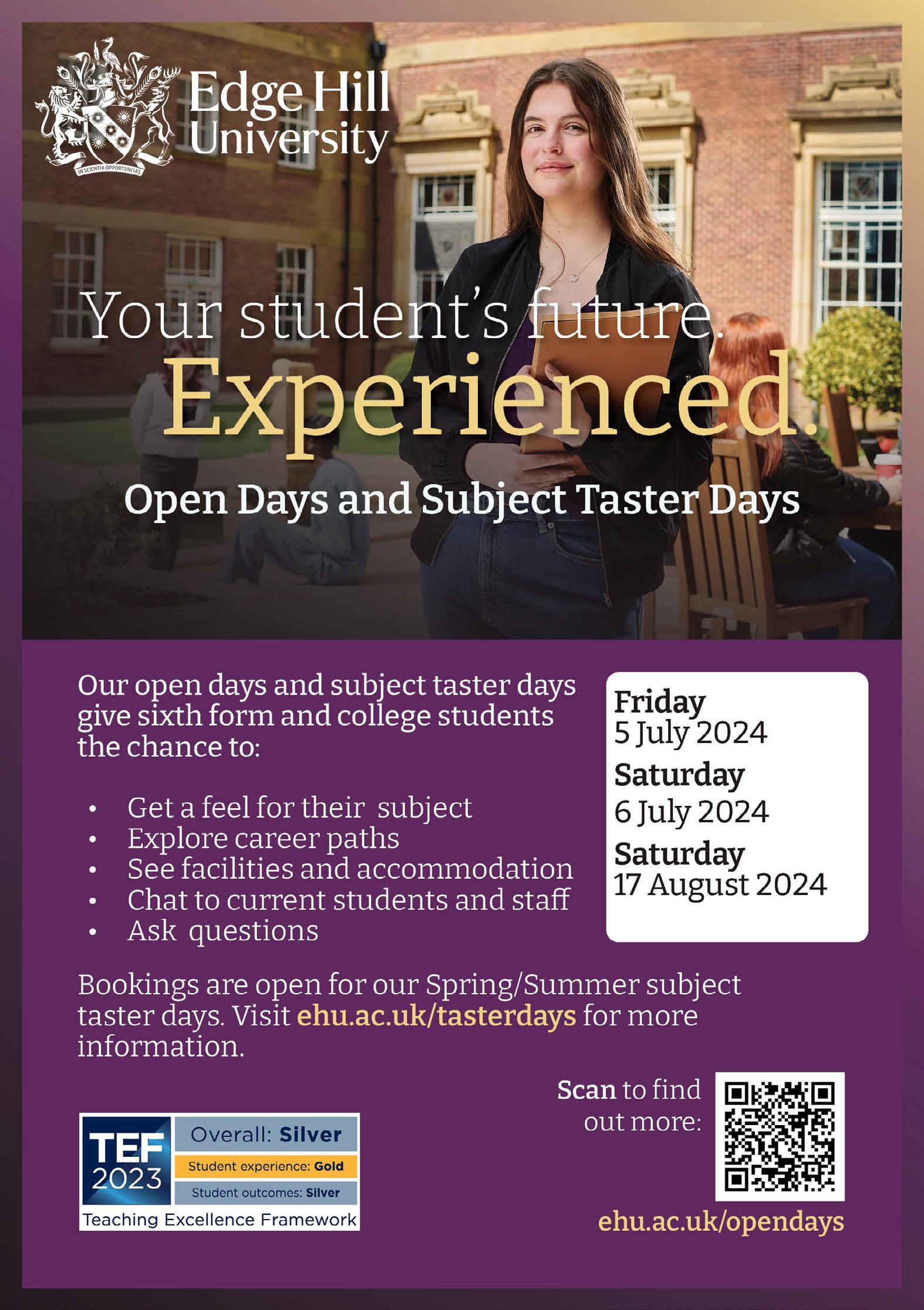
Attending an open day can be a brilliant way to not only learn more about your subject, find out about student life and accommodation but, more importantly, to see if you like the university and could imagine yourself studying there. If you haven’t been to an open day before, you might not know where to start, so we’ve created this guide to help you.
Planning your day will ensure you get the most out of it. Do you want to find out more about your subject and learn about student life, or do you just want to get a feel for the campus first?
“ Noting down the talks you’d like to attend, narrowing down the accommodation options you’d like to look around and writing down anything else you’d like to see will make sure you don’t miss anything on the day. ”
There will be plenty of staff and students on hand to talk to, so we’ve included some example questions that you might want to ask to help get you started.
To ask academic staff:
• How many contact hours a week do I have for my course and how is this split i.e. lectures vs seminars vs lab work?
• How are the modules assessed?
• I’m really interested in X topic, is there a module for this?
To ask student services teams:
• For the accommodation team: How much does each type of accommodation cost? How many other people will live in the flat?
• Funding team: Do you have any bursaries or scholarships that I would be eligible for? What happens if I need additional financial support at university?
• Wellbeing support team: What support do I have access to at university? Who can I contact if I’m struggling?
• Students’ Union (known as the “SU”): What does the SU do for students? Do you have a club or society centred around a certain subject?
To ask current students:
• What’s your favourite thing about university?
• Do you have any tips to help me settle in?
A few weeks before
This is when you’ll want to start thinking about how you’ll get to the university.
Are there any travel bursaries you can claim to help with the cost?
Planning your route and pre-booking tickets can help make the day run as smoothly as possible and reduce expenses. It’s a good idea to check whether there’ll be any travel disruptions, such as engineering works on train lines. And if you have time after the open day, it might help to pop into the local town or city to get a feel for the area.
Also, don’t forget to let the university know if you or your guests have any special requirements in advance of the day.
Universities will send you helpful email reminders and provide updates on their website and social media channels, so keep an eye out for useful information ahead of your visit.
And finally… enjoy your day!
University open days are a great way to find out where you’d like to live and study for the next few years. With so much choice, it can feel overwhelming, so it’s important to do lots of research before deciding on which universities you’d like to visit. Looking online and at university prospectuses is a great place to start, but taking a trip in person can give you a good feel for what your experience would be like.
Before you get to a university’s open day, make sure you’ve read all the communications they’ve sent to you. It’s a good idea to share these with the people you’re going with, so they feel informed and can support you. Find out where you need to register and if there’s multiple campuses, you know which one to go to. Try and give yourself as much time as possible so you don’t feel rushed and can get everything you want from it.
Make sure you ask lots of questions. This is your opportunity to find out what you need to know about the university to help with your decision-making. There’ll likely be student ambassadors around, so speak to them too. They can give you insight into the student experience and share why that university was the one for them.
Take the opportunity to tour the campus, accommodation and any subject facilities. Universities will have different ways of organising these – some may be self-guided and others may be bookable. Don’t be afraid to explore and if you’re not sure, just ask.
Most universities will have a range of talks for you to attend. These can include a welcome talk, to tell you more about the university; subject talks, which will go into more detail about their courses; accommodation talks, to give you an idea of your options; and there could also be information on student finance. It’s best to plan a schedule with all the talks you want to attend but, if there are clashes and you don’t want to miss key information, it’s a good idea to divvy them up with the people or person who may be joining you during the day. Just remember, some universities may ask you to book talks in advance!
If you don’t have the time to attend a full talk at the open day and you only want to know about a certain topic, you could ask if there’s someone available to answer your questions.
Make full use of the facilities to get a feel for student life. Find the Students’ Union, eat in the food/café outlets and see how this compares to other universities.
Hopefully, after visiting various open days, you’ll have a better idea of which ones you’d like to apply to and you can start to get excited about the next chapter of your life! Remember, if there’s something you forgot to ask, or you need more information, make sure you get in touch with the university after your visit.
















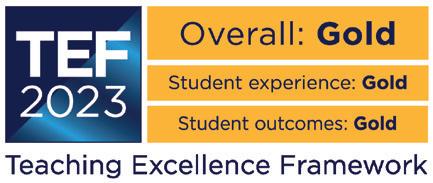
Friday 21st June
Saturday 28th September
Wednesday 16th October
Saturday 23rd November
We want to make our Open Days as accessible as possible, so we’re offering a contribution of up to £75 to your travel costs! You will receive an email after the Open Day with a link to a secure form to fill out to claim your reimbursement.

Book now
hud.ac.uk/open-days

Universities must demonstrate that their events have an ‘impact’ on a student’s knowledge and attitude towards Higher Education (HE). Let’s talk about why universities request different pieces of information for our events and why we do this.
If it’s an event that’s booked through your sixth form or college, your teachers will be asked to provide a student register which includes the date of birth and home postcodes of everyone attending. It’s important to have this information so security services are aware of visitors on-campus in case of emergencies.
If you have booked on to an event as an individual, perhaps a Psychology Taster Session for example, you may be asked for the same personal information as above, as well as your email address.
Make sure your email address is appropriate and one that you check regularly. After booking, you’ll receive a confirmation email along with any additional details of the day.
Your host university will ask you a series of questions which can be split into two categories: questions about your experience at the university and questions about you.
For your experience at the university, you would typically be asked which sessions you found most useful and what you would change. You may also be asked if your knowledge on a certain topic (e.g. student finance) has increased or if your perception of university has changed following the event. These
questions allow universities to see if their events are fit for purpose and if they achieve what they set out to do.
You may also be asked for some personal data, including your postcode, ethnicity and whether you have any of the student characteristics listed below:
• If parents have attended university either in the UK or abroad
• You’re eligible for free school meals
• You have a disability
• You’re from a Gypsy, Roma, or Traveller community
• You’re a refugee or an asylum seeker
• You’re in care or have experience of being looked after by a local authority
• You have a parent/carer who serves in the armed forces.
This data allows universities to see if they’re delivering events to students from all backgrounds, but it also allows them to identify which groups should be targeted during future events. If you’re ever unclear on a question, please ask for clarification from the staff running the event to ensure your responses are accurate.
We analyse your feedback to gain a better understanding of what did and didn’t work during the event, as well as reflect on future provision to support students with their journey to higher education.
Be honest and detailed in your feedback as this will allow us to improve for future events.
Any personal data you’ve provided is safely secured with systems such as the Higher Education Access Tracker (HEAT). This is where we can track how many of the students that we engage with progress onto higher education.
We know that researching university courses can be just as daunting as researching different universities. So, we’ve put together this handy guide to help you decide what course might suit you best.
A Bachelor’s degree is the most common type of undergraduate course. They usually involve studying a single subject, although there are options to combine subjects to create a joint honours or combined honours programme, which is a great option if you’re interested in multiple subject areas. Bachelor’s degrees are usually studied full-time over three years, although many universities offer part-time study options and sandwich years. The most common types available are:
• BA (Bachelor of Arts)
• BSc (Bachelor of Science)
• BEng (Bachelor of Engineering)
• LLB (Law)
Sandwich Programmes
A wide range of degrees have the option to add a sandwich year. These usually take place in your third year of study, extending your overall course length by one year. You’ll incorporate a study abroad or placement year into your course, which will give you invaluable work experience and boost employability, as well as offering a fantastic opportunity to gain experience overseas.
Foundation Year
Some courses have the option of studying a foundation year first. These are usually designed for those who didn’t meet the entry requirements but still have an interest in the subject. The foundation year will help you develop the skills necessary for degree-level
study, as well as increasing your relevant subject knowledge. After successfully completing the foundation year, you would then progress onto year one of your chosen course. Similar to sandwich years, a foundation year will add a year to the length of your degree.
Degree apprenticeships are a great alternative to the more ‘traditional’ routes into higher education. These programmes still lead to a degree-level qualification, but they’re undertaken alongside degree-related employment. This means you’ll be earning money and studying part-time at uni. The length of a degree apprenticeship can vary in duration between subjects and institutions, so if you’re interested, it’s worthwhile researching your options early.
Higher National Certificate and Diploma
Higher National Certificates or Higher National Diplomas are vocational qualifications that take between one and two years to complete. These programmes use practical methods of learning to prepare you for the working world, or for further study at degree-level. These qualifications come in a range of disciplines.
Integrated Master’s
Integrated Master’s courses combine undergraduate and postgraduate study to enable you to graduate with a Master’s qualification. Several subjects offer this kind of programme, such as Pharmacy or Civil Engineering.
Do your research!
Although a course title could be the same across various universities, there are things that will differ, such as course content, accreditation, contact hours and assessment methods.
“ It is important to do your own research by browsing university websites, ordering prospectuses and attending open days to really get a feel for both a course and an institution before making a decision on where to apply. ”
Whether you decide to study part-time or full-time, the most important thing is that you choose what works best for you! Some students worry that they might miss out on the student experience if they opt for the part-time route, but this is far from the truth.
In terms of undergraduate courses, full-time would usually mean three years of study. However part-time study would typically extend this to four or five years. You might be thinking ‘What! That’s such a long time!’, but in all honesty, whichever option you choose, the time will fly by! Personally, I had a very positive experience studying part-time for my Master’s degree. Studying across two years instead of one, meant that I could continue to work fulltime and further my studies.
The main thing about part-time study is that it gives you flexibility to work in a way that suits you. You may have other commitments in your life – a job, caring duties, family – but this doesn’t mean that a degree is impossible to achieve. Something that worked well for me was that I only had to focus on one module per semester or two at most. I felt like I could take more time and give more attention to my assignments, which allowed me to complete my Master’s to the best of my ability.
A key piece of advice would be to RESEARCH. Not all universities will offer part-time options for their full-time courses. So, if something takes your interest, make sure to check what’s available. And don’t be put off if a university you like doesn’t offer flexible study options, it doesn’t mean that’ll be the case for them all.
As part of your research, you may also wish to explore your student finance options. If you’re eligible for financial support whilst studying part-time, take it. Your eligibility will depend on your circumstances, but still take a thorough look to see what support you could receive.
Whether you decide to stay at home, move away or study online, book university open days. They’re a fantastic opportunity to further your research, meet members of the teaching team and probably even other students who are considering part-time study. It’s so much easier to ask your questions in person. For example, you might want to check how many hours a week of study would be required? What is the ratio of solo to group work? When would assessments take place? This information is particularly helpful if you plan to work alongside your studies and need to make your employer aware of your timetable.
So, to sum-up. There isn’t a major difference between part-time and full-time study. You’ll still work towards the same outcome, but the journey is just a little bit longer. If anything, that’s a positive, especially if you have other responsibilities to balance alongside your studies. University is for everyone, no matter what your circumstances. But if part-time study makes your degree more feasible and achievable, go for it!
“ A key piece of advice would be to RESEARCH. Not all universities will offer part-time options for their fulltime courses. So, if something takes your interest, make sure to check what’s available. And don’t be put off if a university you like doesn’t offer flexible study options, it doesn’t mean that’ll be the case for them all. ”
Studying online provides you with the perfect combination of flexible study to fit around your other commitments, together with the benefit of the university’s expertise, experience and employability focus. Most institutions should offer a structured approach to your learning, with a clear, easy to navigate online learning platform as well as dedicated academic and development teams to ensure you have the very best learning experience.
Studying online saves you time and money on commuting and allows you to study anywhere, using various devices, without having to compromise on quality or learning outcomes. The content of the course and assessments should be the same when offered online as well.
Studying an online course means you’re giving yourself the opportunity to work more flexibly within given deadlines and at your preferred time of day. Most institutions provide the option to learn in real-time or on-demand, meaning that in many cases, you don’t need to carry books around with you. You’ll simply need to connect your laptop or computer to the learning platform provided by the university you’ve chosen.
Many students juggle studying online with other responsibilities, whether that’s caring for others or working. This is all possible due to the flexibility of online learning. However, we always maintain that it’s important to have enough hours allocated in your week to commit to your studies alongside any other responsibilities.
Studying online also gives you the ability to gain transferable skills, including time management, communication, critical thinking and self-discipline. As an online student, you’re responsible for completing your tasks and assignments within a certain timeframe and you need to show that you can work independently as well as under supervision. These are all excellent skills that are highly valued by employers.
As an online student, you’ll have opportunities to socialise and join clubs and societies, both with your fellow online students and with those studying in person at the university. You’ll also become a member of the university’s Students’ Union, who are there to represent, support and guide you. And in terms of support, you’ll have access to the university’s employability and study support services as well as free 24/7 counselling online, no matter where you’re based.
At the University of Law Online, we offer all of the above and our dedicated lecturers are expert professionals with real-life experience and training in delivering a great student journey online. You’ll benefit greatly from the expert knowledge they bring to your online classroom.
Gone are the days when all you had to make such a life-changing decision about which university to attend was a prospectus and some open day dates. Now, with all the hybrid options available, such as virtual taster sessions and campus tours, there’s far more out there to help you with your university research.
Often, the journey to choosing your university will start by talking to one of their representatives – someone who knows the courses well and can advise you. This typically happens at your school or college careers fair, or at a larger university exhibition such as UCAS. As every degree - even if they have the same title – and institution is different, a quick conversation with a university rep can really help you to decide which will go on your ‘yes’, ‘no’ or ‘maybe’ pile. It’s a good idea to sign up for more information from the universities you’re interested in, so they can send you details about their upcoming visit days.
Once you’ve got a general idea about which universities are right for you, you’ll then want to start your online research. Rankings are one way to narrow your options, but does that give you an idea of what the university’s teaching staff are like? To give you a more complete picture, try and attend as many virtual events as possible. This can also include subject specific academic taster events. The way the staff deliver their content can give you a flavour of your experience at their institution and help you to narrow your choices even further. There are so many virtual events to try and you can find them all in one place on the UniTasterDays website
You should always try and see a university before making any big decisions. Open days are great for this as they’ll allow you to see everything that’s important to you. From course facilities and accommodation to the library and social spaces. They can help you get a feel for the sort of experience you’ll have, as well as the chance to ask staff and students detailed questions about your chosen course. Open days are also an opportunity to see beyond the nice pictures on a university’s website – you can see it all for yourself.
Some universities might send you helpful virtual content before your visit such as additional webinars, top tips from current students or accommodation tours. Take the time to look through these, they can help you to feel more prepared.
You’ve applied, but the journey isn’t over
You have your offers but the journey isn’t quite over. If you receive an offer from one of your chosen universities, you’ll be likely to be invited to an offer-holder event. There are usually a few dates to choose from, but if you can’t make them, most universities will have on-demand content which you can rewatch at a time that suits you! This additional research can make the difference between university A or B and can help you to make your final choices.
Whether they’re in person or virtual, events are designed to support you and help with your decision-making. Keep asking questions until you’re happy you’ve got all the information you need. Make notes and rewatch the virtual content you’ve been sent to help you with your university and course comparison.
Using a hybrid approach for your university research allows you to cover all bases, but you shouldn’t do one without the other. Virtual events are great to get the ball rolling but inperson events, such as open days, are essential for ensuring the university is right for you. Do a mixture of both and not only will you feel wellinformed but you’ll also feel confident with your choices.
“ Now, with all the hybrid options available, such as virtual taster sessions and campus tours, there’s far more out there to help you with your university research. ”
When navigating university league tables, it’s important for you to recognise more than just an institution’s ‘overall position’. You should consider multiple university league tables with your top priorities for higher education study in mind. And remember – if you discover that the institution you want to apply to doesn’t rank highly on one league table, this doesn’t mean this university isn’t for you!
Which university league tables are available?
There are three ‘major’ league tables: The Sunday Times Good University Guide, The Guardian University Guide and The Complete University Guide. There are also student experience rankings such as WhatUni?, whose figures are primarily based on student surveys and opinion. Then there are international league tables, the most notable being: Times Higher Education World University Rankings or the QS World University Rankings.
What will university league tables tell you?
League tables tell you more than simply which university is the best at teaching. When you look at league tables it is important to understand the methodology that the publication uses. Each source will state which criteria they’ve prioritised or considered - this will include, but
is not limited to: teaching excellence, research and student experience. This will explain why an institution might rank differently between university league tables.
It will also help you understand how the strengths of different institutions are displayed. If you and a friend are interested in the same subject, you may be more concerned about the quality of teaching and student experience, while your friend may be more attracted by the quality of research. The significance of each league table really comes down to you as an individual student and your specific needs.
The different metrics a league table is presenting should also be considered. When viewing tables online, you can adjust rankings to view where a university ranks on the specific criteria you have prioritised as key to your university experience. For instance, if you thrive better in environments with frequent staff support you can arrange the Guardian University Guide to see the student-staff-ratio at each institution, determining how much access you will have to your tutors.
Don’t forget university subject league tables too!
Major university guides will also provide rankings at subject level. Often students will not consider a university because it’s in the bottom half of a league table, but you may discover that the same institution offers the best course in the country for your desired subject! This is especially true for areas like medicine, veterinary science and dentistry, where a smaller number of institutions offer these programmes.

} Explore our campus and get a feel for the local area
} Meet and chat to current students
} Experience interactive subject-specific taster sessions
} Speak with our lecturers one-on-one
} Tour our student accommodation and specialist facilities
Come along to one of our undergraduate Experience Days, on any of the following dates:
Wed 21st February
Sat 23rd March
Sat 20th April
These events are suitable for anyone who has applied or is thinking of applying to study at St Mary’s.
Scan the QR code to book your place
Any questions? Get in touch with student.recruitment@stmarys.ac.uk
Studying a creative course in higher education can be extremely rewarding, especially when the UK creative industries are valued at £109 billion. But different courses can offer very different experiences. Even if you discover two universities with the same course name, the likelihood is they’ll have very different modules and teaching styles. That’s why it’s not only important to do your research into the courses and universities you’re looking at, but to consider what you want to get out of the course.
The first thing to consider is whether you want to focus on theoretical or practical work as part of the course. You could be looking at two BA film courses where one is split into 70% theory and 30% practical modules, and the other is 70% practical and 30% theory. This is where you’d need to consider whether you want to be more hands-on with your learning or commit to academic study.
One way to find out exactly what projects you’ll undertake on a creative course is to check out the course pages on a university’s website. They’ll typically have a section that breaks down what modules or units you’ll take, and you’ll be able to determine from there whether the course is more theoretical or practical. You could also look at any student work that’s available on the page, to give you an idea of the variety of work that’s produced on the course.
But, one of the best things to do is attend an in-person or online open day to speak to the course lecturers and students directly. They’ll be able to talk through the course in more depth and discuss which topics and methods of studying are right for what you might want to do in the future.
If you’re looking into studying a practical course, then you’ll want to make sure the university has the facilities and equipment that will allow you to create!
“
It’s important to consider the spaces you’ll be working in, such as whether there are open studio spaces which allow for experimentation and collaboration, or whether there are booths and rooms for focussed, individual study. ”
When it comes to equipment and specialised facilities, do they have what you need for your current creative practice and do they offer something that you haven’t used before?
Again, you could always start by checking out the university website for photos, videos and written explanations of what facilities and equipment they have available. But, again, an open day is the best opportunity to see how students use the facilities and equipment for their work. You might even be able to have a go yourself…
A final consideration is the course’s entry requirements. If you’re asked to submit a portfolio of practical work, it is usually because the course will have an emphasis on practical projects. Some theoretical courses might still ask for a portfolio though, which is why it’s important to ask lecturers and students about the study experience.
Have you ever thought about studying at a Scottish university and wondered what the key differences are? If so, we’ve got you covered.
With 600 years of excellence in education, Scotland boasts four out of the six oldest UK universities, as well as many modern institutions. In fact, the quality and structure of the education system in Scotland is renowned, and has been replicated by many countries around the world, including the USA.
Typically, a degree in Scotland is four years long. The first two years offer a breadth of study with the final two years providing the specialisation in your subject. Students can also choose to study their degree over three years, but the four-year degree structure is a very popular choice, and it offers some advantages, including:
• The first year of study can give you a greater choice of degree subjects as entry requirements may be more flexible.
• The breadth of subject choice in your first two years of study will provide you with the chance to explore academic areas before committing to your degree specialism.
• The early years of study will help you to improve your study skills and set you up to succeed in your final year.
• A four-year degree provides time to mature and develop as a young adult. You can get to grips with university life and living independently while making the most of the student experience.
Why else should you think about studying in Scotland? Well, Scottish degrees are highly regarded by employers. Every one of our 15 Scottish universities are research focused and 85% are rated as world-leading or internationally excellent. Scottish researchers have discovered and developed many technological innovations that have changed the world. From the steam engine and penicillin to more recent developments such as the MRI Scanner and renewable energy technologies. This high quality of teaching and research translates to excellent graduate prospects, with 92% of Scottish graduates in work or further study within 15 months of graduating.
The application process for tuition and maintenance loans to study at a Scottish university is the same as if you were studying elsewhere in the UK. You can apply for each year of your degree, even if you’ve chosen to study your degree over four years.
Worried about fitting in? Scottish universities are diverse and inclusive, offering a warm welcome to over 50,000 students from more than 180 countries each year. Scotland also boasts some of the safest cities in the UK to be a student. And it’s not all haggis and ceilidhs! There really is something for everyone, with easy access to vibrant cities, beaches, the great outdoors and music and sporting events. If you’re a student under the age of 22, you can also take advantage of free bus travel to make the most of your free time. Our cities are also well connected by rail and you can get cheap flights to the rest of the UK.
“ With 600 years of excellence in education, Scotland boasts four out of the six oldest UK universities, as well as many modern institutions. ”
One of the verses of the Welsh national anthem ‘Hen Wlad Fy Nhadau’, translates into English as:
‘O land of the mountains, the bard’s paradise, whose valleys are fair to my eyes, Green murmuring forest, far echoing flood, Fire the fancy and quicken the blood.’
This description encapsulates Wales perfectly. If you’ve visited Wales, you’ll have witnessed this beauty for yourself, with its plentiful rivers, awe-inspiring mountains, untouched forestry and rugged coastline.
In amongst this beauty, Wales has eight higher education institutions, which all have unique characteristics. Studying in Wales comes with a variety of differences and advantages and we’ll explore some of these here, to help you decide if it’s the right destination for your university experience.
The term, ‘there’s something for everyone’, can sometimes be seen as a bit of cliché. However, when it comes to studying in Wales, it’s a term that’s true in every sense. If you love the outdoors, why not try some of the following activities:
• Surfing or kayaking at our worldrenowned beaches in Barafundle, Rhossili and Tenby
• Adventurous walks in Bannau Brycheiniog (Brecon Beacons) or Eryri National Park, where you’ll find Wales’ highest peak: Yr Wyddfa
• Taking a dive on the fastest zipline in the world over Penrhyn Quarry Lake
• Leisurely strolls along the 870-mile Wales Coastal Path
• Coasteering near one of the world’s smallest cities, St Davids in Pembrokeshire.
If you’re someone that enjoys the hustle and bustle of city life, the four larger cities – Cardiff, Swansea, Newport and Wrexham – will most definitely have something for you. With a wide variety of music venues, restaurants, bars and shops, there’s bound to be something that appeals to your tastes and interests. For more ideas about what to do in Wales, head to the Visit Wales website.
Unfortunately, the cost-of-living crisis is having a detrimental impact on most peoples’ lives. However, studying in Wales will help many students with this issue, due to the cost of living in Wales being lower than the UK average. This will help you to keep more of your student loan and hard-earned money and allow you to enjoy all that Wales has to offer.
I’d encourage you to extensively research any additional funding which may be available. For example, if you’re successful in securing a place at a Welsh university to study an allied health care profession, you would be eligible to apply for the Welsh NHS bursary which will cover your university fees and living costs. More information can be found on the Welsh NHS Bursary website.
One of the biggest misconceptions about moving to Wales is that you must speak Welsh to get by. This is not the case. However, many Welsh universities offer free language classes if you’re interested in learning some of our basic phrases which have existed for over a thousand years. This should make the road signs much easier to read as you travel around this beautiful country. Pob lwc! Good luck!
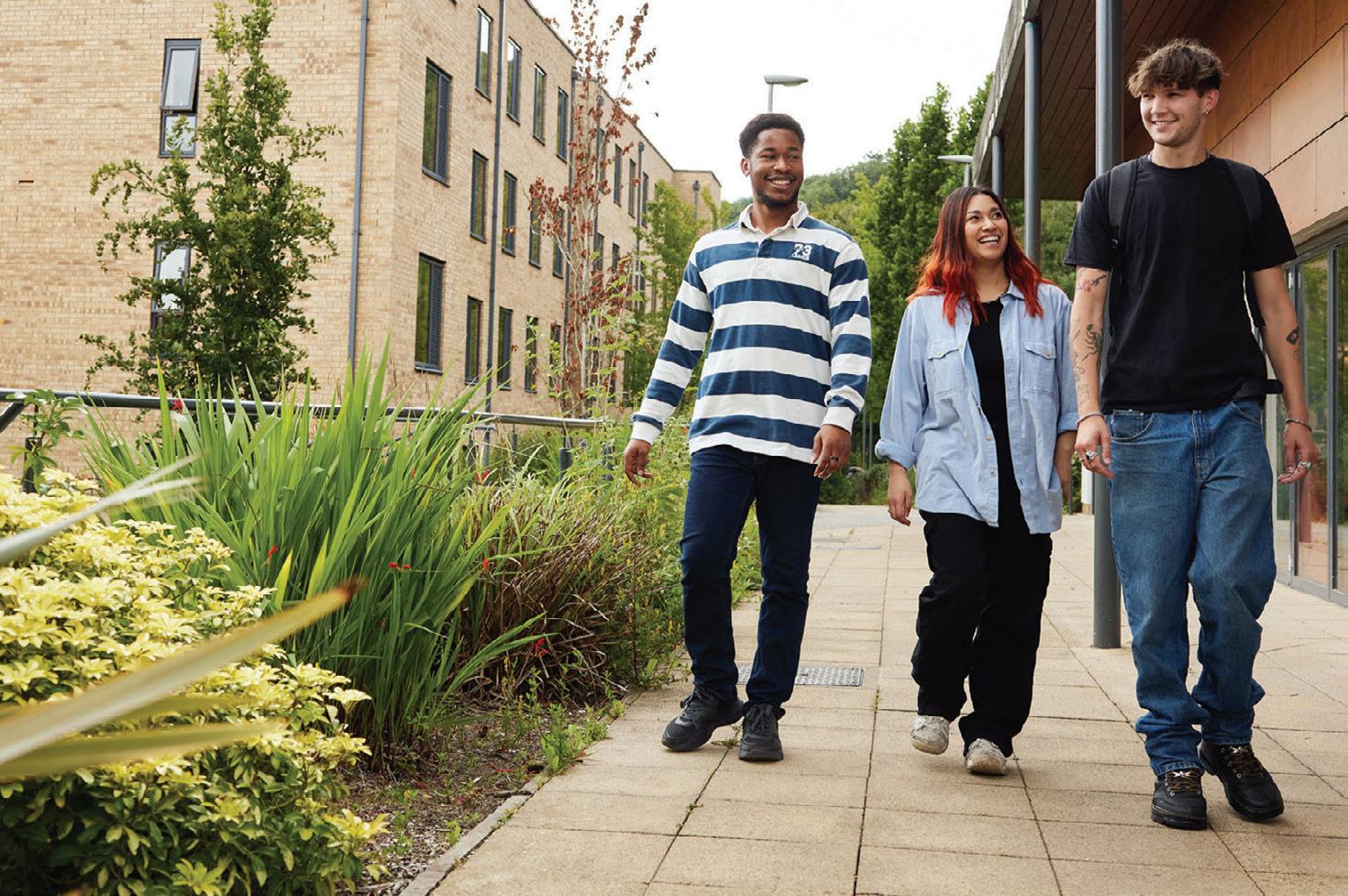

Experience life as a USW student at one of our upcoming Open Days. Scan here or visit www.southwales.ac.uk/opendays to book your place.


Finding a course, pathway, university and future career that is right for you can be an overwhelming prospect. But if you research and ask questions, there’s a wealth of knowledge and advice available. This article will help you uncover more about degree apprenticeships and what you can expect on your journey.
If you choose to complete a degree apprenticeship, you’ll apply through your chosen company’s application portal - the same as when applying for a job - perhaps submitting a CV and cover letter. Entry requirements vary based on the company and apprenticeship you’re applying for, so you’ll need to check each application carefully. At this stage, you may also want to research the university linked to the degree apprenticeship. Will you have to travel far? Are lessons delivered in person or via distance learning? Most companies advertise degree apprenticeships year-round and don’t follow the usual university deadlines, which gives you plenty of time to explore!
Once you’ve secured a place, the fun can begin! You’ll spend the majority of your week in the workplace, gaining hands-on experience, with one day a week at university. You’ll be paid a salary if you study for a degree apprenticeship
and teaching fees are covered by the company, which many students see as a real positive. While you’re studying at the university, you’re still able to access key student services, such as academic and wellbeing support. You may also have access to Student Union events and societies, but you’ll need to think about balancing any hobbies with your work commitments.
As part of your degree apprenticeship, you’ll also have assessments which vary based on your course. They could involve written tests, coursework, group projects or practicals. Assessments are there to test your ability to do the job and secure theoretical knowledge from your studies.
Once you’ve completed your degree apprenticeship, and depending on the course, you could have anywhere between three and six years of workplace experience as well as a Bachelor’s degree. This fantastic achievement will likely provide you with huge steps in terms of your chosen career and could also help you move forward into higher roles within the company. Some degree apprenticeships also provide entry into professional bodies which offer accreditations.
Degree apprenticeships are not only for school leavers or those at the start of their careers. This route of study is available to anyone looking to deepen their knowledge and fill any gaps in experience.
It’s a great idea to start chatting to companies about the degree apprenticeships they offer and start looking at their websites. Also, attend university open days to speak with staff who can help prepare you for the process.
There’s a lot of nonsense spoken about student finance. Not only because it’s fundamentally misunderstood by millions, but also as the system has changed so often, even if you talk to someone in their second or third year at uni now, the way it works for them is different to you, never mind those who graduated a decade or two ago.
At the start of the 2023/24 academic year, we saw the biggest shake-up to student finance in England for a decade. On the surface the changes looked like a tweak, but in practice it increased the eventual cost of going to university by over 50% for many typical graduates. Of course that’s not what you want to hear, but it’s fact.
Yet my aim isn’t to put you off going… I still believe if university is right for you, grab the opportunity. It can be life enhancing and often lead to increased earning potential – but the fact the cost to you is more means it’s worth a deep breath and a serious, practical look at whether it is right or not, or if there are other, better options.
My focus is on the personal not the political, what university will cost YOU – so you understand the impact on your pocket – and that is radically different to what you usually hear.
My five rules below are written for new starters who are first-time undergraduate English residents. Those from elsewhere in the UK, see www.moneysavingexpert. com/students/which-student-loan-planam-i-on-/, or if you started before 2023, see www.moneysavingexpert.com/students/

student-loans-tuition-fees-changes/. And even this is only a summary – for more detailed help, including whether you should be taking the loan, see my expanded guide at www. moneysavingexpert.com/students/studentloans-england-plan-5/.
1. The student loan price tag can be £60,000, but that’s not what you pay
Students don’t pay the university or other higher education institutions directly. Tuition fees, typically up to £9,250, are paid for you by the Student Loans Company. Over a typical threeyear course, the combined loan for tuition and maintenance can be over £60,000, but don’t get overly hung up on that, as what counts is what you repay...
• You should only start repaying after you leave university (which for you is defined as April 2027 at the earliest).
• Then you only repay if you earn over £25,000 a year. Earn less and you don’t pay anything back.
• You repay 9% of everything earned above that amount, so earn more and you repay more each month.
• The loan is wiped after 40 years – whether you’ve paid a penny or not. This means many people will be repaying their student loans for most of their working lives.
• There’s no worry of debt collectors as it’s repaid via the payroll. In other words, it’s taken off what you earn before you get the money, just like income tax is. And the debt doesn’t go on your credit file.
2. There is an implied amount most parents are meant to contribute
You are eligible for a loan to help with living costs – known as the maintenance loan. Yet for most under-25s, even though you are old enough to vote, get married and fight for our country, your living loan is dependent on family residual income, which for most people is a proxy for ‘parental income’.
The loan received starts to be reduced from a family income of just £25,000 upwards, until around £65,000ish (it depends whether you live at or away from home and whether in London) where it’s roughly halved. This missing amount is effectively an unsaid parental contribution – as the only reason you get less is because your family earns more.
For 2024 starters, the FULL annual loan is:
• £8,610 if living at home.
• £10,227 away from home.
• £13,348 away from home in London.
To work out the parental contribution, just subtract the loan you’re being given from that. Or far easier, use the calculator at https:// www.moneysavingexpert.com/students/ student-loan-parental-contribution-tool/ which does it all for you.
Of course, some parents won’t be able to afford to fill that gap – and you can’t force them to pay. But at least knowing there is a gap helps you understand what level of funds are needed. And it’s important students and parents have this conversation sooner so you can discuss options to plug the hole.
While the media often focuses on tuition fees, I hear more practical complaints from students about the living loan – many find even the maximum loan isn’t big enough. And this has got worse as the living loan has not been uprated close to the increase in inflation during the cost of living crisis (something I wrote to the Chancellor to try to get change on – I failed).
So when deciding where to study, look at all the costs, transport, and accommodation (will you get into halls?), as that’s a key part of your decision.
3. The amount you borrow is mostly irrelevant day to day – it works more like a tax
This bit is really important to understand, as frankly it turns the way you think about student loans on its head. So, take your time to think about it and understand it…
What you repay each month after university depends solely on what you earn – it’s set at 9% of everything earned above £25,000. To emphasise this point, for a graduate who earns (for the sake of easy numbers) £35,000...
• Owe £20,000 and you repay £900 a year.
• Owe £50,000 and you repay £900 a year.
• In fact, let’s be ridiculous and say tuition fees have been upped to £1m a year, so you owe £3m+, you still ONLY repay £900 a year.
So how much you borrow DOESN’T impact what you repay each month or each year. The only difference it makes is whether you’ll clear the borrowing within the 40 years before it wipes.
It’s predicted that 52% on the new loan system will clear their debt in full within 40 years, and 48% will be paying off their loan for the full 40 years. So unless you’re likely to be a mid to high earner (or don’t take the full loan or have access to large amounts of spare cash), don’t overly focus on the amount you ‘owe’.
Instead, in practice what happens is you effectively pay an extra 9% tax on your income for 40 years. In simple terms (ignoring national insurance and personal allowance withdrawal), it works like this:
This doesn’t make it cheap, far from it, but it does mean that all the talk of burdening students with debt may feel misleading. Instead, we’re burdening graduates with something closer to a 9% extra tax. Frankly it shouldn’t be called a debt, it really doesn’t work like one (I argue it should be renamed a graduate contribution system).
Another way to look at it though is the more you earn, the more you repay each month. So, financially at least, this is a ‘no win, no fee’ education.
4. Interest is added, but there’s no ‘real’ cost to it, and not everyone pays it Student loan interest is set based on the Retail Prices Index (RPI) rate of inflation – a measure of how quickly prices of all things are rising. It changes annually each September based on the prior March’s RPI. That’s likely to be far lower for the 2024/25 academic year than it has been, likely 3% to 4%.
However, as your interest is set at just RPI inflation, in economic terms it means there’s no real cost of the interest added to your loan.
To explain this, imagine if you borrowed enough to pay for 100 shopping trolleys’ worth of goods at today’s prices. You’ll only ever at most repay whatever it costs to pay for the same 100 shopping trolleys’ worth of goods in the future – not more.
Yet the interest added isn’t the same as what everyone repays. While many graduates may be charged interest, some won’t actually PAY any interest at all.
That’s because the interest only has an impact if you’d clear your initial borrowing in full over the 40 years before it’s wiped. Many won’t. And even of those who will, all but those who clear the loan in full over that time won’t repay all of the interest added. So don’t panic too much at the ‘interest’ accruing on your student loan statement.
5. The system can and has changed Student loan terms should be locked into law, so only an Act of Parliament can negatively change them once you’ve started uni – but they’re not. And a few years ago we saw a very
bad change imposed, though thankfully after much campaigning it was overturned.
Most of the past changes were about the repayment threshold (the £25,000) rather than bigger structural issues, and indeed I would view the repayment threshold as ‘variable’ –meaning it can be changed at the whim of administrations.
You can take some reassurance from the fact the latest ‘new system’, like the previous ones, only impacts those who started after 2023, as that means that governments are wary of major systemic retrospective negative changes. So big, bad changes for individuals once they’ve started are unlikely (though not impossible). Even so, the last of my need-to-knows has to be the caveat of ‘unless things change’.
Why does the new system cost so much more for many?
The cost of a student going to university has long been split between the state and the individual (paid in the years after they’ve studied). The Government decided to swing the pendulum even further towards the individual and away from the state, with three big changes under the new system which started in September 2023:
• It lowered the repayment threshold, so all those above the threshold pay more each year – a bit like freezing tax thresholds, this means as people earn more, they pay more.
• Most importantly, it extended the maximum time you repay for from 30 to 40 years. This has a huge impact.
• It did one positive change – the rate of interest added has been reduced to RPI inflation (it used to be up to RPI +3%), though that mainly benefits higher-earning graduates who’ll clear the whole loan in 40 years.
So, while under the old system for each pound spent on higher education the Government funded 44p and the student 56p, under this new system on average the Government will fund 19p and the student 81p.
Other important student guides to read: How to budget as a student
Best student bank accounts Student checklist
The Disabled Students’ Allowance (DSA) is financial support that’s offered to UK students who are studying at university and who have a disability or specific learning difficulty. To be eligible for the DSA, you must be studying an undergraduate, postgraduate, foundation or equivalent degree. This article will explain the different DSA allowances across the UK, the type of support available and how to apply for them.
The following allowances are one-off, single payments and are not dependent on family or personal income. You should look at the allowance for where you currently live, rather than where you’re going for university.
• Up to £26,291 excluding travel (2023/2024 figures)
• Applications are managed by Student Finance England
• For NHS-funded courses, you need to apply through NHS Student Bursaries.
• Up to £33,146 excluding travel (2023/2024 figures)
• Applications are managed by Student Finance Wales
• For NHS-funded courses, you need to apply via your university’s disability service.
• Up to £25,000 excluding travel (2023/2024 figures)
• Applications for all courses are managed by Student Finance Northern Ireland
• Up to £27,405 (2022/2023 figures)
• Support is split between basic allowance, large items allowance and non-medical personal help allowance. Each with its own maximum allowance.
• For all courses, applications are managed by the Student Awards Agency for Scotland
If you find that your DSA allowance does not cover all your requirements, your university’s disability adviser will be able to help you apply for additional funding from other sources (if available).
The DSA support can be split into four main areas: specialist equipment, non-medical, general and travel. The DSA covers the extra disability-related costs or expenses you have while studying. These are over and above those provided by a university.
The types of support covered by the DSA can include:
• computers, printers and scanners. In England you are required to pay £200 towards the cost of a new computer
• specialist software e.g. voice recognition, mind mapping or screen reading software, including any training required
• specialist furniture e.g. chair, table or back support
• non-medical support e.g. sighted guides, specialist mentors, mobility trainers, communication support workers or British Sign Language (BSL) interpreters
• specialist tuition e.g. study skills support for dyslexic students
• travel e.g. private taxis to attend study.
It’s important to note that the DSA does not cover any support you’d need if you weren’t a student, such as personal assistance at home.
If you’re applying for student finance through your relevant loans company, there’ll be an option for you to select that you would also like to apply for the DSA. You can do this after you’ve completed your main application. If you’re only applying for the DSA, you’ll need to make sure you complete the DSA1 form.
“
It can take up to 14 weeks to process a DSA application, so it’s important to do this as soon as you’ve submitted your UCAS application. ”
Applying in good time will ensure that your support is organised before your summer holidays and that you receive any necessary equipment before you start your studies. Keep an eye out for requests for additional information, such as your needs assessment.
It can be helpful to speak to a disability adviser at your school, college or chosen university before you apply, to receive personalised advice about your needs, as well as support with filling in the DSA application.
You’ll need to provide evidence alongside your form, which can include one of the following:
• a diagnostic assessment of your disability or specific learning difficulty
• a disability evidence form from your student loans company
• evidence from a qualified medical professional
Support can look different for every student, so research is key. Use the links provided in this article for more information about the allowances in your country.
The One in Five is a university support podcast created by disabled students, for disabled students who are considering university.
All the content you will hear on the podcast is based on the lived experiences of the incredible One in Five student panel – Alice, Dominique, Jessica, Kyle, and Matthew.
Listen to all episodes: www.unitasterdays.com/listen-to-the-1-in-5-podcast
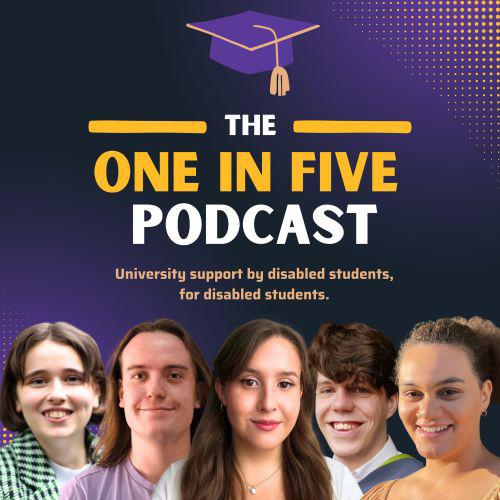


University can feel overwhelming with applications, decisions about accommodation and exams all coming your way at once. On top of this, you need to think about budgeting at university and applying for student finance.
Luckily, if you’re studying a healthcare related course in England, there’s extra financial support to help you through the NHS Learning Support Fund (Also known as the “LSF”).
“
The LSF was set up to support students on healthcare courses to make sure that there’s a diverse and large NHS workforce in the future. If you’re eligible, you’ll receive at least £5000 for every academic year that you study. ”
The LSF is made up of five different allowances, from general training support to funding for parents. These allowances aren’t loans, they’re grants. As long as you complete your training, you won’t have to pay the LSF back.
To be eligible for the LSF, you must be eligible for a tuition fee and maintenance support from the Student Loans Company and be studying for a pre-registration healthcare course in England. Please see a list of the eligible courses below:
• Dental Therapy or Dental Hygiene (level 5 and 6 courses)
• Dietetics
• Midwifery
• Nursing (Adult, Child, Mental Health, Learning Disability)
• Occupational Therapy
• Operating Department Practitioner
• Orthoptics
• Orthotics and Prosthetics
• Paramedics
• Physiotherapy
• Podiatry Or Chiropody
• Radiography (Diagnostic and Therapeutic)
• Speech and Language Therapy
If you’re studying a healthcare course in Scotland, Wales or Northern Ireland, there’s extra support available, but this is different from the LSF. Look here for more details on non-England funding.
The LSF is split into five different allowances:
• Training Grant: £5,000 grant per academic year. Not means tested, so everyone gets this regardless of household income, and not a loan, so you don’t have to pay it back.
• Parental Support: Extra £2,000 a year if you have a child under 15, or under 17 with a SEN.
• Exceptional Support Fund: Up to £3,000 a year for unexpected financial hardship.
• Specialist Subject Payment (Known as “SSP”): Another extra £1,000 if you’re studying specific subjects. Currently, the SSP is offered to anyone studying Mental Health or Learning Disability Nursing, Radiography, Prosthetics and Orthotics, or Orthoptics and Podiatry.
*You must apply for this travel fund by yourself through your university, so remember to keep track of your receipts!
• Travel and Dual Accommodation Expenses: Funding to cover any extra costs due to travel to and from placement, and support if you need temporary accommodation during your placement*. .
To apply for the LSF, you need to go to the NHS Business Services Authority website Applications normally open in the Spring before the academic year begins and you have until six months after your course starts to apply. However, we’d recommend applying as soon as you have your offers confirmed. And, just like student finance, you need to reapply every year.
A final note
This information was true at time of writing, but details of the LSF may be updated at any point, so do check the government website to find the most up to date information.
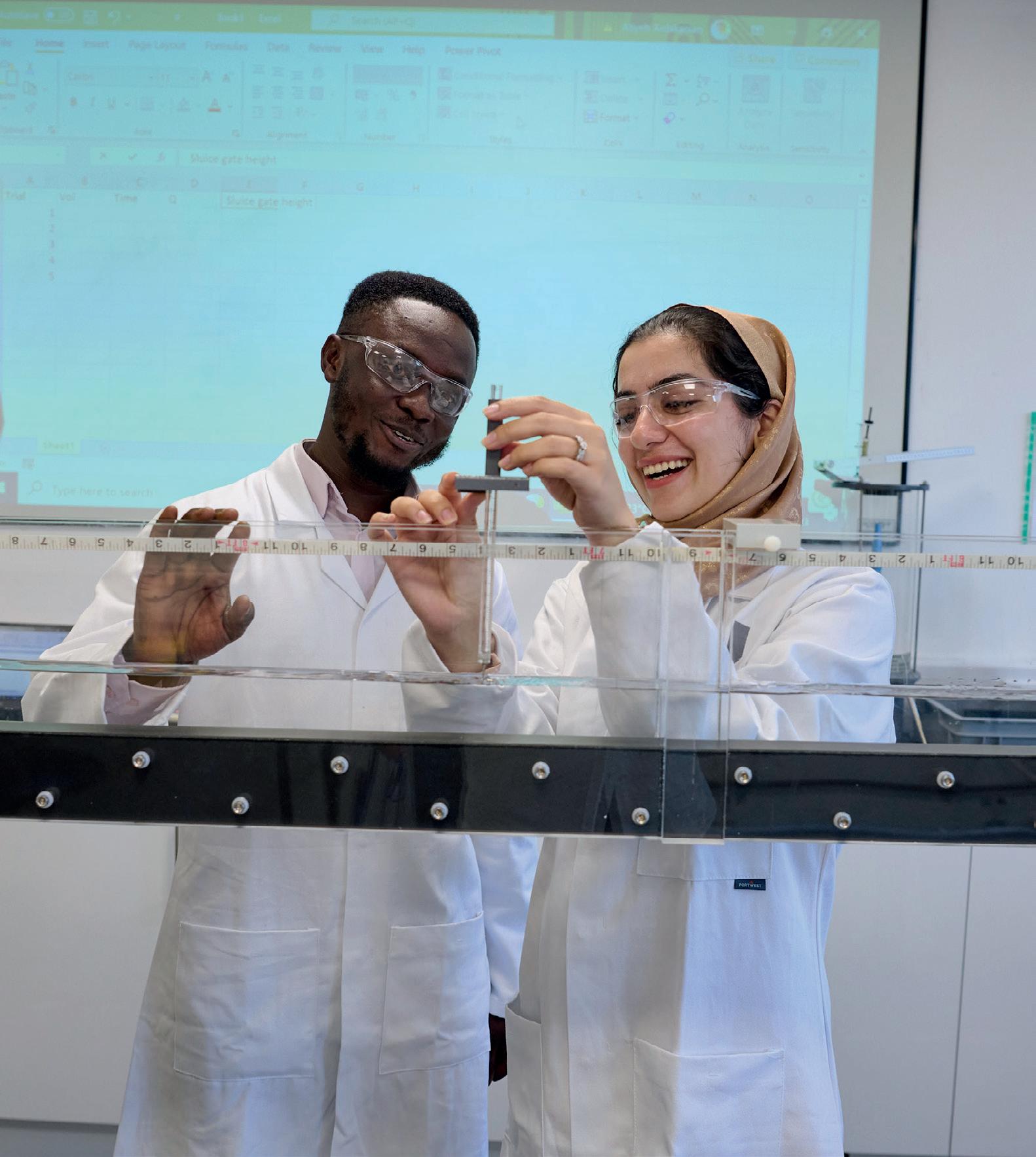
Find out more about our careerfocused courses by joining us at one of our open days:
uwl.ac.uk/open or download our prospectus now!
uwl.ac.uk/prospectus
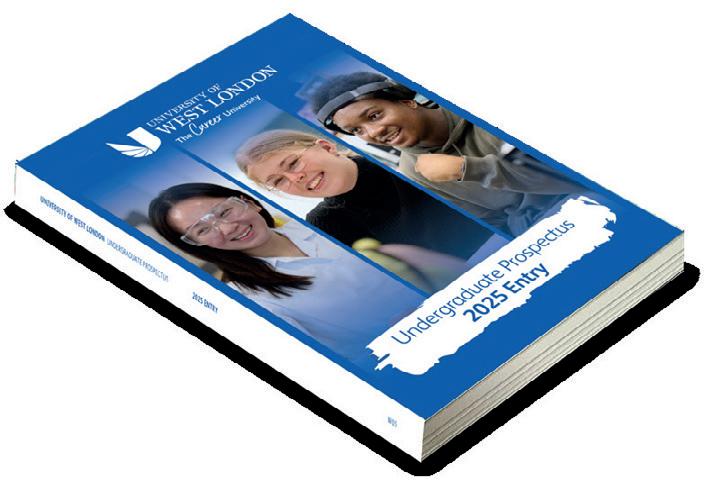
In addition to student finance support, it’s worth searching for scholarships and bursaries that may help you fund your studies. This is money that you don’t have to pay back, though usually there are conditions attached before they’re awarded to you.
Typically, you’ll find the terms ‘scholarships’ and ‘bursaries’ mentioned in the same sentence. A scholarship is often awarded based on academic, sporting or musical merit, whereas a bursary might be awarded based on other criteria. Providers of scholarships and bursaries use their own terminology, so it’s probably not worth debating too much about how the terms are used and instead consider how you can go about getting the free money that’s on offer.
The first step would be to check out the scholarships and bursaries available at the universities you’re applying to. Search their website or contact them directly to find out what they’re offering.
A bursary might be awarded from the university itself depending on whether you meet certain criteria. Sometimes, that award is automatic, and you don’t have to do anything if you disclose the necessary information in your UCAS application. For example, you might be care-experienced or a young carer. You
might also have attended a summer school or other activity run by that university, or you may be from a postcode area with low progression rates to higher education. If you’re applying for a healthcare course, you could be eligible for an NHS bursary. All qualifying criteria and associated terms and conditions are specific to the university or organisation offering the bursary, so it’s important to check these out.
The list of ways for you to qualify for a scholarship could be even longer. You might be an outstanding sports person and the university would love to have you playing for their first team. Perhaps you’re an aspiring musician or have a desire to study a ‘shortage’ subject, such as engineering. Any organisation or private individual can assign a sum of money to help a student or a group of students. For example, the musician, Stormzy, has a scholarship available for black students from the UK to apply to the University of Cambridge. Use a search engine to find the scholarship and bursary directories – do you meet the criteria for a scholarship or bursary on offer?
If you’ve done your research on what’s available, the next step is to get organised. Check the deadlines for applications and any terms and conditions. You can always contact the awarding organisation if you’re unsure about anything.
Some bursaries and scholarships are highly competitive, so it’s important you give them a good reason to award the money to you. Never be ashamed to apply; remember someone is giving away this money for a good reason. It’s there for the taking. If you meet the criteria, go for it and good luck!
“ If you need to submit an application, make sure it’s persuasive and get a second pair of eyes from someone you trust to check it over. A teacher or member of staff at your school or college would be ideal. ”
One of the biggest changes you’ll experience when you start at uni is how to manage your money.
You can apply for a student loan to cover the cost of your course; this gets paid directly to the University. You can also apply for a maintenance loan, which is paid directly to you. This contributes to your living and studying expenses, and is means tested on your household income.
“ The first term of university is a learning curve. You’ll quickly gauge where you might need to be more frugal! ”
Depending on your circumstances, other funding might be available to you, including:
• Disabled Students’ Allowance (also known as the DSA)
• Childcare Grant
• Parents’ Learning Allowance
• Dependants’ Grant.
Student bank accounts can come with some really handy benefits. For example: some banks offer a free student railcard when you open an account with them, giving you a third off travel until you’re 25; they’re brilliant for saving money on journeys. Shop around to get the best deals
and think about what will really benefit you in the long run.
To become a pro at budgeting your uni finances, you need to master how to shop as a student. A quick win is your weekly food shop: getting together with friends, batch cooking, and choosing supermarket own brands are a few ways to keep your budget in check. Learning how to cook nutritious meals, with inexpensive ingredients, is an essential skill and it’ll save you money in the long run. Look in the reduced section in local shops and supermarkets, or try a local market for fresh fruit and vegetables (they are often much cheaper than you think).
Then there’s clothes. This can get pricey, but there are still budget-friendly options. Charity shops are always a good place to start; as are online apps, such as Vinted (some may even offer further student discounts!)
Preloved clothes fairs are becoming popular at universities, so look out for posters advertising these.
Having a part-time job, that fits around your studies, can help to supplement your loans. Not only is it important, financially; it also helps you develop vital life skills. Local employers usually turn up to Freshers’ Fairs, so don’t miss out! Or why not look for jobs at your university? Many have student ambassador programmes, which offer flexible and well-paid job opportunities.
Write everything down, so that money is easy to keep track of. This includes everything that’s coming in, and going out, of your bank account.
Choosing and applying to university can be quite overwhelming. With 100s of universities and 1000s of courses available, there’s a lot to consider! You can do plenty of research in advance about which university could be a good fit for you, but one of your main questions right now might be, can I get in?
Every university will have their own entry requirements and an overview of these can be found on UCAS. We’d also recommend going on university websites for a more thorough look and using that as a good basis to do your research and shortlisting.
For most universities there are minimum entry requirements. These often include GCSE’s or other equivalent Level 2 qualifications. Generally, there’ll be an English language requirement which is typically an English GCSE at a certain grade. This is set by each university. There could also be subject-specific GCSE/Level 2 requirements that are relevant to your chosen course, so be sure to check.
Typically, universities will want to see evidence of your Level 3 qualifications, the most common being A levels, BTECs and T Levels, but this can also include the Welsh Baccalaureate, International Baccalaureate, Scottish Highers, Advanced Highers and the Ireland Leaving Certificate. Every university will ask for different grades depending on your qualifications.
They may also ask for specific qualifications and not accept alternatives, so again, be sure you look at a university’s website to ensure they accept the qualifications you have or are completing.
Most universities will advertise their entry requirements in qualifications and grades but they might also provide a number. This equates to the amount of UCAS tariff points associated with your qualifications and grades. You can search for your qualifications on the UCAS tariff calculator by the course title. Once you enter your grades, or predicted grades, the calculator will generate how many UCAS tariff points you have. This can be a helpful indicator when researching a university’s entry requirements too.
Some universities may have alternative offer schemes, which will have clear criteria and will depend on your circumstances and experiences. If you’re eligible, you’ll typically receive a reduced offer or additional consideration, depending on the course you’ve applied for. Again, this varies from university to university, and you’ll be able to find this information on the university’s website. You can find out more about contextual offers on page 47.
If you don’t meet a university’s entry requirements but believe you have the skills or qualifications that make you a suitable candidate, you can contact a university’s enquiries and admissions team who’ll be able to advise you on your next steps. Universities will often take account of alternative qualifications and experiences.
What next?
UCAS is a good place to start researching your options. Then, once you start to filter down your choices, we’d always recommend you start visiting university open days.
Tip from
Search 1000’s of university events at: www.unitasterdays.com/search
University events will provide you with an opportunity to find out more about the course and ask any questions you may have. Good luck with your application!
As you progress through Key Stage 3 and Key Stage 4, you will be exploring lots of different opportunities in the wider world. Through your exposure to colleges, higher education institutions, apprenticeship providers, employers and other opportunities, you will have a myriad of choices to navigate.
Teachers and careers advisors will signpost you to potential futures and help to guide you through the process, making sure you have an ambitious but also a realistic vision for the future. But you can also conduct your own research, to make sure you have the correct qualifications to study a course you love.
GCSE pre-requisites
English Language and Mathematics at GCSE are imperative for students who are looking to progress to higher education. It is important that you achieve a Grade 4 or above for you to progress onto both Level 3 and higher education provision.
For some courses GCSE Science will also be very important, particularly if you are thinking
of studying science courses (including Dentistry, Medicine, Nursing, Psychology and Veterinary Science).
When you are investigating Level 3 courses, I would recommend that you always have one eye on your next steps, to make sure the courses you are selecting are going to enable you to progress to it.
You may have ideas that are potentially going to prove challenging in terms of your academic abilities and you may need guidance towards appropriate opportunities. For example, whilst you may not be able to progress towards a Medicine degree, there may be other opportunities within the NHS or healthcare sector that you could explore.
It is important that throughout the process you review entry requirements for both your Level 3 and higher education options.
Alongside this, it is also crucial for you to look closely at university prospectuses and websites, to ensure you are considering the right option choices for the higher education course you may wish to pursue in the future.
I would recommend that you always have one eye on your next steps, and to make sure that the courses you are selecting will enable you to progress to them. ”

Universities are eager to ensure we foster inclusive, fair and welcoming learning communities for all students, no matter their background. With that in mind, many institutions will provide additional support for key groups of students. This usually includes students who are the most under-represented within higher education institutions in the UK, according to a combination of institutional and national statistics.
But what does ‘under-represented within higher education’ actually mean?
Under-representation in higher education can be determined through a number of different means. Institutions will consider national statistics on how many people move on to higher education or employment in the UK. Universities will also aim to provide additional support to applicants from groups that may have experienced barriers in accessing higher education and assess their need based on set eligibility criteria. Many of these criteria are informed by higher education funding and governance bodies. These can include:
• First-generation students – students who are first in their immediate family to attend university
• Care experienced and estranged students – students who have spent time in local authority care or are estranged from their family
• Young carers
• Black and ethnic minority students
• Mature students – students aged 21 or above on application, with no qualification above Level 3
• Refugee and asylum seekers
• Students from Gypsy, Roma, Traveller, Showmen and Boater communities
• Students with a disability or long-term physical or mental health condition
• Students from military or service backgrounds e.g. their parents/ carers have served or are serving military personnel
• Students living in low progression areas.
What’s on offer?
Both universities and HE-based projects, such as Reaching Wider in Wales and Uni Connect in England have their own programmes and eligibility criteria, so it’s important to check with each when you’re considering where to study. Some institutions offer targeted summer schools based on variations of the above criteria, while others offer scholarships and bursaries. Support may also include:
• Reduced entry criteria/Contextual admissions. For more information, see page 47 of this guide.
• Access to monetary scholarships or bursaries – provided by the institution to support students with study or accommodation costs. These don’t need to be repaid.
• Mentoring, often with current students at the institution
• Tailored events and activities with the institution, such as campus tours, residential events or online skills sessions
• Ongoing targeted support, including one to one support with university research and applications.
Universities are committed to ensuring that anyone who wishes to access the courses they offer can do so with as little difficulty as possible. To support this, institutions have targeted programmes to support those who are statistically more likely to encounter barriers. Each university has its own programmes and support packages, so make sure you do your research.
Many universities across the UK talk about their ‘contextual’ admissions processes or ‘contextual offers’. They form a visible part of university social mobility initiatives and they may be among the things a university mentions when talking about how they help disadvantaged or under-represented student groups access their courses.
A contextual offer is an offer that is lower than the standard entry requirements for a course. For example, if a course typically requires students to achieve AAA at A Level, a student who receives a contextual offer might be asked to achieve ABB.
Is that all?
No, and this is the bit that can be confusing. Contextual offers only form part of a university’s contextual admissions process.
Contextual offers are made to students who meet one or more specific criteria. And if you meet these criteria, it can give you access to more than just a reduced offer. This might include bespoke financial support before and during your studies; support in finding and securing accommodation; access to individuals and teams who provide advice and specialist support; and transition support packages, such as being able to arrive at university before the rest of the cohort arrive to give you additional time to settle in.



The support available to you will depend on your specific needs and the criteria you meet.
Every university has their own policy and will have specific guidance on how they define and identify if a student qualifies for contextual consideration.
These are usually found on bespoke webpages on a university’s website. Some universities even have checker tools to help you understand their criteria and identify your eligibility.
This is the easy bit – universities get all the initial information they need about you from your UCAS application, so you don’t have to do anything! When you set up your UCAS profile, you’ll be prompted to provide information about yourself and asked about a set of characteristics. Fill this out carefully and make sure you tick all the boxes that apply to you. This will help the universities you’ve applied for to identify your eligibility for their contextual admissions process.
After that, if the university needs any further information from you, they’ll usually get in touch via email. Make sure the email you use for your UCAS profile is up to date, that you have access to it at all times and remember to check your junk and spam folders regularly. Failing to respond to universities who need further information from you can result in delays in receiving your offer or even in missing out on contextual consideration.
Spend some time looking at different universities and their contextual offer policies, criteria and support packages. Think also about your priorities and needs, so you can make the right choice for you. And if in doubt, get in touch! University staff are always happy to help.




Applying to university can be quite a daunting task at the best of times, but some people have additional barriers that can make it even harder. Widening participation and access programmes can really make a difference to those who may experience these barriers and they can offer support to students from underrepresented communities.
What are widening participation and access programmes?
Widening participation and access programmes are designed to encourage students from all backgrounds to consider university, particularly those from underrepresented groups within higher education. These programmes aim to show you what university is like, as well as provide information on the support available to students.
“ Universities strive to offer dedicated help to all students and will tailor the support for each individual based on their needs. You can experience what universities have to offer through events such as taster days and summer schools, which are designed to show the additional support available to students based on their access and participation needs.
Why are these programmes important?
Universities want to show you how they can help with your application and how they can support you as a student. It’s an opportunity
to find out about the support services and guidance available to you. This could include additional financial support, such as bursaries, or information about study support. Widening participation and access programmes are also a great way to enhance your personal statement and they give you an opportunity to interact with like-minded individuals who may be in a similar situation.
How do I access them?
Most schools and colleges will be invited to participate in widening participation (WP) and access programmes but you can also book onto these programmes by signing up or contacting the university directly. Other programmes may ask teachers to refer students directly. Ask your school or college if they are in contact with any universities about their WP and access programmes. It’s also worth checking university websites and social media channels to see what’s happening near you. Websites such as UniTasterDays.com are great for seeing what activities and events are happening across the country.
Each university will have their own criteria on how they identify students for their widening participation and access programmes. It’s important to contact your local university, or the universities you are interested in attending, to find out their WP criteria.
Some universities offer contextual admissions, which means that your personal circumstances may be considered as part of your application and could lead to lower entry requirements. Your application will not be negatively affected by declaring your circumstances, quite the opposite in fact. You might be entitled to additional support and could even be eligible for a bursary or scholarship. You can read more about this on page 47.
Each university will have its own widening participation and access programmes, so it’s important that you contact the university you’re interested in to see what support they offer and to check your eligibility. Universities want to help you, so get in touch and ask the questions that are important to you. ”
Putting together a portfolio to support your application for a creative degree can sometimes be a daunting task, especially after you’ve spent so much time crafting the perfect personal statement and putting together the best application you can. The good news is that universities can give you lots of advice to help you get started.
What’s a portfolio?
A portfolio is simply a collection of work that demonstrates your creative ability. Like your personal statement, it’s a way to help universities get to know you and understand the kind of creative practitioner you want to be. When we look at your portfolio, we’re looking for potential and what you might bring to the course.
How big does it need to be?
While there are no strict rules regarding the size or format of a portfolio, universities usually offer guidelines on what they expect, how to submit it and the amount of work to include. Check this information carefully before you get going and make sure you stick to it.
How do I send it over?
Some universities may ask you to submit a digital portfolio online. Before you start, check their guidelines to make sure you get the platform, format and file size correct. Think as well about how you can best capture your physical work digitally. For example, if you’re photographing your work, think about the background, composition and lighting to make sure it’s the star of the show!
For in-person interviews, consider the practicalities of safely transporting a physical portfolio so it remains secure and dry. If it’s digital, think about how you’ll present it in
person - don’t assume you’ll have access to a device unless you bring one with you!
Most students studying creative subjects will include work from their coursework or exam projects in their portfolio, but you can include absolutely anything that you feel is relevant. Try to bring in as much recent work as possible though – ideally things you’ve done in the last couple of years – as this will give universities the best insight into your current skills and knowledge.
My top five tips for preparing your portfolio:
• Follow the guidelines. Use entry requirements and portfolio guidance on university websites to help you.
• Show your process. Sketchbooks and development work are just as important as those fabulous final pieces.
• Demonstrate variety. Show us a variety of ideas, techniques and processes so we can see that you’re not afraid to experiment and try new approaches.
• Take time to edit. Universities won’t be able to see everything you have, so include what you think shows off your ability. Remember, quality over quantity!
• Think about the order. Arrange your work in the order you want it to be seen. This might be based on its relevance for the subject area you’re interviewing for, or it could be chronological – it’s up to you. Whatever order you choose, show us your favourite piece of work at the start to make a great first impression.
Finally, remember that your portfolio is a reflection of you! We’re interested in discovering where you want to go with your creativity and, more importantly, how we can help you get there. The portfolio is like a window to the inside of your mind, so don’t be afraid to show us who you are and what you’re passionate about.
What is the personal statement?
The personal statement is used by university admission tutors to assess your suitability for a course. They want to know why you’re interested in the programme and what skills and experience you have that will prepare you well for university study.
The personal statement is the part of the UCAS application process that often takes the most amount of time and effort. Largely because it can determine whether you receive an offer, so it’s important to give yourself enough time to plan, write and edit until it’s exactly how you want it.
• You only write one personal statement which goes to all five of your university choices. With this in mind, keep it relevant to all the courses you’re applying for and avoid being specific about certain universities.
• The maximum you can write is 4000 characters or 47 lines, whichever comes first.
• All applications are processed online through UCAS and your statement will pass through plagiarism detection software.
A blank document can seem daunting, so it’s best to start with a plan. It could be a mind map or a word document, whatever works best for you. Start by asking yourself:
• What made you interested in this subject?
• What wider reading have you done?
• What experiences have you had that relate to the subject?
• How will the degree help you with your future career plans?
There’s no set structure to the personal statement and what you write about will ultimately depend on the course you’re applying for and your experiences. However, here’s a recommended structure to follow:
• Introduction. Write a couple of sentences about why you’ve chosen to study your chosen subject. Where does your interest stem from? When did you discover it?
• Share your love of the subject. Go in depth here – what do you specifically enjoy about your subject? For example, if you’re interested in Biology, your specific area of interest might be genetics. You should then go further to include examples of when you’ve gone beyond your school or sixth form syllabus to learn more about it. Taster days, online courses, wider reading (journals and articles) and even academic podcasts are great to include. Don’t just name drop though, make sure you’ve really engaged with those activities. Anything you mention in your statement could be discussed in more detail during an interview.
The personal statement is used by university admission tutors to assess your suitability for a course. They want to know why you’re interested in the programme and what skills and experience you have that will prepare you well for university study. ” “
• Briefly mention your studies. You don’t need to list what you’re currently studying, it’ll all be on your UCAS application, but it’s a good idea to share how the skills and knowledge you’re gaining now will benefit you once you start your course. How do they link with what you want to do and how are they preparing you for your next step?
• Additional experience. Here’s where you should include any experience you’ve gained that relates to your course. Even if you think you don’t have anything to reference, a part-time job is still great to mention. They give you skills such as teamwork and communication, which are useful for all university degrees.
• Hobbies. A few sentences about what you do in your spare time and what skills this has given you, such as time management. If you’re nearing your character limit, don’t cut words from other sections to include information about your hobbies. The detail about your course interests and experience is key.
• Conclusion. Write a sentence or two summarising how university will support your future career plans.
When writing about your experiences, you don’t just want to list them. You want to expand to include what you’ve gained from them and how they’re relevant to the course you’re applying for. We’d recommend having the ABC method in mind as you write. Try and do at least A and B as much as possible:
• A – Activity – A brief description of what you did
• B – Benefit – What skills or experience did you gain from doing this activity?
• C – Course – How does it relate to the course you’re applying for?
Your personal statement should be your own work. However, feedback, especially from your subject teachers and your tutor, can be really useful. They’ll have read many statements in the past and can give you some constructive advice. You could also ask friends and family as they might remember things you’ve missed out.
Give yourself time, plan accordingly and show off your skills and experiences!

As the University of business, practice and the professions, City provides students with the employability skills needed to go further in their careers. City Students are equipped with the tools to build brighter and more rewarding careers.
By choosing City, you are welcomed into a community where aiming higher, thinking smarter and creating a better future is what drives us forward.
Applying to university is probably going to be the first major application you’ve made! This guide will walk you through the steps and outline the important deadlines.
Students usually need to apply for a place at university via the University and Colleges Admissions Service (UCAS). There are specific deadlines throughout the process, some vary depending on where or what you’re applying for. In 2024/2025 these will be:
• 3 September 2024: complete applications for 2025 entry can be submitted via UCAS.
• 15 October 2024 at 18:00 (UK time): the deadline to apply for any course at Oxford or Cambridge university as well as the deadline for most medicine,
dentistry and veterinary medicine/sciences courses at all other universities.
• 29 January 2025 at 18:00 (UK time): the deadline to apply for most other courses.
• 26 February 2025: UCAS Extra starts. This is where you can add more university choices to your application if you aren’t holding any offers.
• Mid-May 2025: If you applied to your chosen universities before 29 January, you’ll have heard back from them by mid-May.
• Early June 2025: You’ll have a deadline around this time when you need to reply to the offers you received. This is when you’ll choose your firm and insurance choices.
• 5 July 2025: UCAS Extra will close and Clearing will start.
• Mid-July: You’ll have heard back from your chosen universities by now if you applied after 29 January but before 30 June.
*Please ensure you check the UCAS website to confirm all dates.
Sticking to these deadlines will guarantee that you’re given equal consideration on your application. You can still apply after this if universities have courses that are still accepting applications. Bear in mind that your school or college will also have their own internal deadlines to keep you on track!
Universities will have until mid-May to make a decision on all on-time applications. They’ll consider all of the information you’ve provided on your application to help them make an informed decision on whether to make you an offer.
As part of the admissions process, you may be invited for an interview or audition or required to take an admissions test. If you’re applying for creative courses, you may also be asked to submit a portfolio of work. ” “
Decisions you may receive:
You can keep track of your offers on your UCAS Hub. The Hub is where you can view your offers as well as any communications from prospective universities. Offers are made from September 2024 right up to July 2025 (depending on when you applied), so don’t panic if your friends are receiving replies at different times. Even if they’re from the same university, it’s not a bad sign!
Types of offers are explained more fully here.
Don’t panic if you’re not holding any offers once you’ve heard back from the universities you applied to. There are other options available to you. You might still be able to apply through UCAS Extra. Or, if not, there are plenty of opportunities available in Clearing.
• Unsuccessful – this means that you have not been made an offer to study at that university. Sometimes the reason for an unsuccessful decision will be shown on your UCAS Hub.
• Conditional offer – this means you’re guaranteed a place to study at that university provided you meet the conditions of your offer. Usually this means achieving certain grades e.g. ABB.
• Unconditional offer – this means that you’ve got a place at that university regardless of the results you’re yet to achieve. Be cautious of some unconditional offers. Some universities ask you to accept certain terms and conditions to confirm your offer, which might not always be in your best interests. For example, you may be asked to accept their offer by a certain point in the UCAS cycle to guarantee your place, which might not give you enough time to make a well-informed decision.
Going to university is a big decision whether you’re a school or college leaver or a mature student. There are so many choices, from picking the right course and university to narrowing down your options. Once you’ve selected your university choices and received your offers, the next stage can seem uncertain. Here’s where we can help!
What happens next?
Once you’ve received decisions from all the universities you applied to, you’ll need to decide which university you’d like to go to. UCAS will give you a deadline by which you need to respond to your offers, which you can find on your UCAS Hub.
If you’ve received more than one offer, you’ll need to make a choice about which is going to be your firm choice, this is your first-choice university and your insurance choice, your second option. If you meet the conditions of your offer on results day, then you will be committed to your first option. Your insurance choice is there as a backup, just in case you don’t get the grades you were expecting. With this in mind, your insurance choice should be a university that has made you a lower offer. You can find out more about the choices you need to make and when on the UCAS website.
There are plenty of resources available to help you make your university choices, including offer holder events. Each university calls these events something different, but the most common titles are offer holder days, applicant days or experience and insight days.
When do these events usually take place?
Offer holder events are typically held in the spring. However, the timings and format of these events changes from university to university. Researching when these events are and getting in touch with your chosen universities for information and advice is a great way to get started with your university decision-making.
Travelling to your chosen universities can foster a sense of belonging and speaking to current students will also give you a chance to hear their opinions and gain some peer-to-peer support. You can also explore the local area to help you get a feel for what there is to do around the university.
What do offer holder events look like?
Normally, offer holder days have a strong subject focus. Activities at these events might include having a look at the different amenities at the university; taking a campus tour of the facilities and services; listening to a welcome talk from senior leadership; or going for an introductory talk at your academic department. There may even be subject workshops for your specific course, as well as some general university activities around student life and experience. You can expect drop-ins, workshops and talks with student support teams, including The Students’ Union and Student Advice Services.
Why attend?
Offer holder events are a tangible way for you to engage more widely in the culture and network of your chosen universities. Some universities extend offer holder days to all who are interested, while others reserve these events just for people holding a conditional or unconditional offer. It’s a good idea to get in touch with your university choices to see how they run their offer holder events.
Once you’ve received decisions from all the universities you applied to, you’ll need to decide which university you’d like to go to. UCAS will give you a deadline by which you need to respond to your offers, which you can find on your UCAS Hub. ” “
Great, you’ve chosen your university and now it’s time to choose your accommodation. It’s an important and exciting part of the application process, but where should you start? Well, the first thing to consider is whether you’re going to stay at home or move away. There’s lots to think about, so let’s start with the basics:
If you’re staying at home, you can still get involved and have a great university experience. You’ll get to meet new people on your course, by joining clubs and societies and by hanging out with friends at their student accommodation. You’ll more than likely save money and have all your home comforts too. Bonus.
If you’re moving away from home, the first thing you’ll gain is independence! You’ll learn to cook, clean, meet lots of new people and be able to enjoy the full university experience. There are many things to consider when moving away from home, such as costs and the types of accommodation available. Let’s look at these in more detail now.
Student halls are small flats that you share with other students. You’ll have your own bedroom, which will include a bed and desk as standard, but your kitchen will be shared with the other students in your flat. Bear in mind that some accommodation has en-suite bathrooms and some will require you to share with your hallmates. And the final thing to consider: food. Some student halls are catered, meaning you don’t need to worry about cooking but, again, this can work out more expensive than choosing the self-catered option.
Students often move into student housing in their second year to share with friends they’ve made in their first year. The good thing about this, is that you can split the cost between you! By this point, you’ll probably know your housemates well and can form your own uni family! You’ll be surrounded by other students if you enjoy the social aspect of student accommodation and there’ll still be support available from accommodation staff if necessary.
Prices for student halls and houses vary depending on location, facilities and distance from your university. Consider accommodation a little out of the city centre if you’re looking to save some pennies or ask yourself whether it’s really worth forking out more for a double bed! Not bothered about sharing a bathroom? You could make a saving there too.
You might choose to privately rent a house or a flat by yourself or with other students. This means that you’ll have a private landlord and the accommodation is not student-centred. Privately renting also means you have more choice when it comes to where you can live in your university city/town and also the type of property you live in. A few things to consider when renting privately is that the accommodation will not be staffed like student halls, so you’ll have to deal with your landlord/ letting issues directly to resolve any issues. You also won’t be surrounded by other students and your bills are often not included. Again, this may sound right up your street and be a perfect option for you.
Everyone’s different and there’s no right or wrong type of accommodation. As long as it’s budget-friendly and it makes you happy and comfortable, you’ll have a great time. ”
Results day can be a stressful and anxious day for many students. But don’t worry, you’re not alone. There is plenty of help available so that you’re prepared for when you start.
If you’ve achieved the grades you need for your chosen university, congratulations! Now is a great time to check that you’ve completed the necessary steps to get your university journey off to a smooth start. Here are a few things to consider:
• Check your emails and post regularly to ensure you’ve received information on how to access your university account.
• Register with your university as soon as possible to receive the relevant information for your course. This will also ensure you receive your first student finance instalment on time.
• If you’re going to be living on campus, make sure you know your move-in date. If you need support or assistance, speak to the accommodation team at your university for more information.
• Get any parking permits, gym memberships or other subscriptions that you might need once you arrive.
• Gather the contact details for any support services your university offers. You’re coming to a new institution where you’ve not studied before and you might be living independently for the first time. It’s important that you settle in as soon as possible. You won’t know everything and it’s normal to feel nervous about starting university. If you need help, always ask.
If you didn’t get the results you were expecting, don’t worry. Clearing is a great option for finding alternative courses and routes into higher education. You’ll find plenty of information about Clearing on UCAS and on university websites.
Getting ready for independent study
You might feel uncertain about the transition from college or sixth form but you’ll never be on your own to navigate the changes. Universities have specific support teams to help you learn new study skills, but here are my top tips to get the ball rolling:
1. Invest in some decent stationery for organising your work.
2. Study the course information carefully to avoid investing in expensive equipment you don’t need! If in doubt, ask.
3. You can study whenever and wherever you like now you’re at uni. Try out different locations, methods and times until you find what suits you best.
4. Keep your motivation up by breaking your studying into chunks. Techniques such as the Pomodoro method and the 20/20/20 system can be really useful.
5. Make sure you give yourself enough time to rest. All-nighters sound great in theory, but if you can’t keep your eyes open in class the next day, it won’t be worth the lost sleep.
6. Remember, if you are struggling with anything, don’t be afraid to seek help from the university’s support services or your teachers.
Broaden your horizons in a place you really belong.
Welcome to Liverpool Hope.


Find out more about our undergraduate courses.
Going to university can be as scary as it is exciting. So, what can you expect when you arrive and how do you navigate the first few weeks?
Everyone’s circumstances will be different but for many, going to university will be your first experience of living independently. This means taking responsibility for your budget, looking after yourself (cooking, cleaning, laundry) and generally managing life on your own.
It’s a really good idea to work out your weekly budget so that you have a clear idea of how much money you’ll have to spend on food, your social life and any extras once you’ve paid for accommodation and bills. Learning to cook will save you a load of money and can also be fun. You may also find it helpful to look online for ideas for cheap and easy student meals before you start.
Making friends and fitting in
University is a great opportunity to meet people from all walks of life and many students say that making lifelong friends is one of the best
When
settling in, everyone is
in the same boat and probably just as worried as you, so try not to stress too much. You’ll definitely meet people with the same interests as you on your course, which is a good place to start when it comes to finding common ground. ” “
things about their time at university, but it can also be one of the biggest sources of anxiety for new students.
If you’re staying in halls, introduce yourself to your new flatmates. Have a cuppa and plan to attend some Freshers events together; there’ll be lots to choose from, whatever your interests. Student societies may have taster sessions where you can try out different activities and see what you enjoy.
One of the biggest differences you’ll find when you get to university is that you’re expected to be an independent learner. That means it’s up to you to get your work done and on time. No-one is going to check on whether you’ve completed your assignment or revised for your exams – it is your responsibility. Developing good time management skills is key so that your workload stays manageable. Use a planner to track and organise your study schedule. And remember, there’s a lot of support at university if you’re struggling, but you still need to seek that help yourself.
We asked our current students to share their top tips for student life and here’s what they said:
• Don’t forget to try new things. These are the memories you’ll carry into the future
• Be kind to yourself and take care of yourself and your studies
• Get a railcard as soon as you can to get cheaper travel
• Bring plenty of Lemsip in preparation for Freshers’ Week!
University can be exciting but also challenging. Remember, you can ask for support at any time if you need it. From friends, family and tutors. Your time at university will move fast, so embrace the opportunities and have fun. Although you may want to reconsider that party if you have a 9am lecture…
The
– is it the same for everyone?By Mertila Myftari, Student Recruitment Officer at Brunel University London
If you’re concerned about making friends at uni because clubbing and parties aren’t your thing - don’t worry, there’s so much more you can do to find your group of people.
Speaking from experience as a recent graduate, I didn’t do those things and I still made great friends. I lived on campus during my time at university and, at the beginning, I limited myself to only socialising with students from my course. And that wasn’t a bad thing, I just didn’t know how to meet people without going out on student nights.
Are you missing out on the ‘university experience’?
When the university experience comes to mind, you could be thinking – ‘I would rather start working instead of chasing the university experience that everyone talks about’. Apprenticeships are widely considered and going to university doesn’t sound like the best idea for everyone.
For me, my time at university was very different to the ‘traditional university experience’ I heard about at school. This was because I found
friends who had the same hobbies and interests as me through sports and societies.
I also made sure networking wasn’t just a professional activity but also an enjoyable one. When I joined the Business society, for example, I learned more about job opportunities but I also met people I still stay in contact with now. Networking is mentioned constantly when graduates are looking for jobs but the truth is, networking is more about human connection, whether it results in an exciting job opportunity or not.
Another way you can meet people is through university societies. I joined the Boxing and Islamic societies, and from our first meet-up until the last, I constantly met new people. Finding people that you have things in common with is the best way to enjoy your time at university. It becomes so much more than studying and going out.
My advice would be to research societies, sports or university groups. Make it part of your selection process and ask yourself the questions that are important to you. This may include:
• Are there opportunities to volunteer?
• Does it have communities I would like to join?
• Does the university have a sports team I’d get involved in?
You may be spending three or more years there, so what type of university experience would you like to create? ” “
When joining university, there are certain things you expect: having to do your own cooking and washing, the excitement of Freshers’ Week and the shock of doing more independent study. However, there are many other opportunities that might not have crossed your mind and which can completely change your university experience!
There are societies that you’ll be able to find at most universities in the UK. Societies such as theatre, student radio and political clubs. As well as sports societies such as football, rugby and badminton. But if you have more unique interests, or you want to try something different, there are still plenty of options. For example, you can try your hand (and broom) at a Quidditch Society, experience your own ‘Walking Dead’ moment at The Zombie Apocalypse Survival Society or get together with fellow chocolate bar lovers at the Caramel Wafer Appreciation Society. Whatever takes your fancy, university gives you the chance to find people who love the same things as you.
In my third year of university, a few of my friends joined the Snow Society, which arranged trips to skiing and snowboarding spots all around Europe. I had never tried skiing because I always knew I couldn’t afford it. However, societies tend to have discounted trips or choose options which make it more affordable for students. They opt for coach travel instead of flights, for example. That meant I was able to join the society and experience one week skiing
in the French Alps for a third of the price! I only just made it down the beginner slope, but it was a trip I’ll never forget.
So, whether it’s travelling to another country, climbing a mountain for charity or attending your first festival, university can open many doors to new places. ”
Societies aren’t the only way to immerse yourself in university life. Some have student-led networks that aim to support the students around them, campaigning for change and raising awareness for causes that are important to them. Networks you might be able to join include LGBT+ groups, international student panels, disabled student networks and BAME schemes. These groups speak directly to the university to influence change for current students. For example, if you joined the BAME society, you could work to ensure that books in the university library are diverse, deliver workshops to university staff on how to include all cultures within their curriculum or speak to the wellbeing team to make sure all students are provided with the support they need.
Do you have entrepreneurial spirit or a business idea that you’ve been thinking about for years? University can help you with that!
Many universities in the UK have entrepreneurship centres or teams which help students develop, expand, market and run their own businesses. What’s great about this help is that it’s not limited to students studying business-related degrees; you can study anything whilst building your own business. If you happen to be studying business, some universities will also offer you the opportunity to spend a placement year (or sandwich year) designing and building your own business with extensive help from their enterprise teams.
University societies are a great way for you to meet new people with a common interest, much like after-school clubs. They cover a variety of topics: academic, sporting and general interest. If it exists, there is probably a society for it!
General interest societies or clubs cover a range of topics: from wellbeing to drama societies, you can get involved in activities that you are interested in, such as creating fundraisers, going on trips and weekly games, activities and quizzes.
Academic societies support you in specific subject areas, creating a community by bringing together students who are on the same course but may not be in the same classes. These societies can help you form study groups and informal seminars, as well as providing a brilliant way to swap reading lists and books.
Sports societies can be for both competitive and casual players, and you can pick and choose which elements you want to be involved in. Some sports societies, like football and basketball, take part in the BUCS (British Universities and Colleges Sport) league. Different societies can also take part in varsity competitions between universities too.
• They are associated with a students’ union (SU), which is independent from the university. You will automatically become a member of your SU unless you ask not to be. They are led by students for students.
• Most sports and societies will have a membership fee – these vary from society to society. To pay these, you can pay online or in person at your SU. The payment is not associated with the tuition loan and is separate from your studies, even if you are joining an academic society.
• For trips, societies may ask for additional payment, which may be discounted. Trips could include travelling abroad, going to the theatre etc.
• Societies are run by students who are likely to have been members themselves previously. They are voted in for different roles and volunteer to run the society under the supervision of the SU.
• During the first few weeks of university (commonly known as Freshers’ Week, but many universities now call it Welcome Week or Welcome Fest), you can attend fairs where you can meet the students who run the clubs and societies and can often try them out!
• If you would like to join a society that does not yet exist, you can group together and create one!
I always encourage students and applicants to get involved with sports, clubs and societies as it made my student experience the full, exciting and interesting one that it was, and it helped me flourish as an individual. ” “
Many students choose to go to university to improve their future career prospects, but with so many graduates now entering the job market, a degree alone is not always enough. It is therefore very important that you work on developing your employability skills throughout your time at university, and university careers services are experts in offering a range of support to help you achieve this successfully. I will provide a guide to this here – and plant some seeds, so hopefully you take advantage of it!
Careers service support is available throughout university courses
In your first year, you might need help finding part-time work or student ambassador roles, and many careers services will source and advertise such opportunities. They will also have the expertise to support with CV creation and job applications.
In second or subsequent years, you might need advice when searching and applying for work experience, placements and internships, all of which are excellent ways to boost employability skills and add valuable professional experience to your CV.
The final year is when life beyond university becomes a reality, and you will certainly benefit from careers support (although many would benefit from accessing it earlier!). University careers services are specialists in the graduate labour market and support students to search and apply for graduate opportunities. They can also advise on postgraduate study options and careers in academia.
Careers Fairs take place regularly at university to enable you to meet potential employers. Other events such as presentations, workshops, industry trips, employer panels, mock interviews and mock assessment centres all contribute to ensuring that you are well informed about your career options, and well prepared to tackle the various application processes.
Alongside events and activities, the careers services also offer individualised careers information, advice and guidance. Career guidance meetings are available with qualified, specialist careers advisers. You can explore your future plans and career aspirations with an adviser and develop action plans to help you achieve your goals. Careers advisers can help everyone make their next steps into work or study – even (and especially!) those who have no idea what they want to do.
Universities take graduate employability very seriously (it also feeds into league table results!) and there is always lots of support available. Sometimes it is embedded within degrees and included as part of the course, but often events, activities and opportunities are extra-curricular and optional, so you need to make sure that you are proactive in engaging with the careers service to make the most of what’s on offer.
Once you start a course, my best advice is to find out where the careers team are located at the university, what support is on offer and get involved with it! You should also look out for Skills Awards which lots of universities offer – these are programmes which students can follow to develop and record their experiences and skills. ” “
Advice from
There is huge support to develop outside of your studies at university. Everything from support launching a business, to learning a language. We would encourage you to take advantage of it.
Deciding what to do after school or college can feel like a scary decision. It might be useful to think of it as the first step towards building your future, instead of your end goal. Be confident that whatever path you choose, you will continue to develop your employability.
Your options will include:
• Continuing your studies at university.
• Pursuing an apprenticeship to study and work at the same time.
• Securing a job, perhaps even starting your own business.
• Taking time out.
How will a degree develop your employability?
Put simply, employability is all the things that make you employable.
People generally consider university as an option to boost their employability. The way you will learn at university will be different to school or college and whilst this might feel daunting, you have the opportunity to develop your skills and explore new experiences that you can showcase to future employers.
For example, higher education can help you to develop skills that can be transferred from studies into the workplace. Throughout your degree, it is likely that you will learn how to present your own views and how to change your communication style for different audiences, which will improve your communication skills.
What do students say about their university experience and employability?
“
It (my degree) did increase my employability, especially in my current job. My manager said to me, I like that you did a bit of everything. It even shows that you’re good at researching, you know how to find resources...there’s a lot of transferable skills. ”
“
Just even being in university, being able to talk to people from different countries, from different backgrounds and interacting and working together with those people. I feel like you gain skills that would be useful in our global workplace in the future. ”
Equally, these types of skills can be gained from other aspects of your university experience. By joining a club or society, you can work alongside and collaborate with others to develop your teamwork skills.
In addition, your chosen subject will also help you gain specific skills, knowledge, experiences, and qualifications that are often required and useful to working in a particular job or industry. For instance, studying a Law degree will help you develop legal related skills, experiences, and qualifications needed to become a Paralegal, Solicitor or Barrister.
Even if you end up studying a degree that is unrelated to the job you want to do, employers will recognise and value the transferable skills, experiences, and qualification you’ve gained from that degree. Employers see achieving a university degree as evidence of your capabilities, motivation, and hard work.
It is also important to recognise the different work opportunities that you can get involved in during your time at university. For example, securing summer internships, opting for a placement year, and engaging with the careers service. This will help build your networks and knowledge on the sector you’d like to work in one day.
Sources:
What’s Next Course, University of London
Apprenticeship Standards for England and QAA Qualifications Framework
Jen Barton Durham University
Natasha Berry University of Huddersfield
Milena Bittmar Edge Hill University
Jon Cheek UniTasterDays.com
Lauren Clarke Liverpool Hope University
Darren Clinton University of South Wales
Vanessa Conman University of York
Steph Coogans University of Chichester
Andrew Cooper University of Liverpool
Ellen Coyle
Liverpool John Moores University
Becky Emmerson University of Salford, Manchester
Holly Grey University of London Careers Service
Meg Griessel St Mary’s University Twickenham
David Handy
King Edward VI College Stourbridge
Anna Hawes Falmouth University
Emily Jordan University of Winchester
Charlie Kettlewell University College Birmingham
Susie Kilburn
City, University of London
Martin Lewis
MoneySavingExpert.com
Suzie Loader University of Exeter
Ailsa Mackay
Heriot-Watt University
Scott Mahoney University of South Wales
Sophie McMullan Aston University
Lydia Messenger University of Sheffield
Paige Morgan
University of Essex
Louise Musgrave University of Law
Mertila Myftari
Brunel University London
Maya Patel
Brunel University London
Joshua Phillips University of South Wales
Leanne Punchard University of Suffolk
Alexandra Rhian Roberts
University of South Wales
Caspian Robson University of Exeter
Lydia Runham Aston University
Marica Shelbourne University of Huddersfield
Alishba Shuja University of Sheffield
Amy Slater-McGill
Aston University
Gavin Spoors Norwich University of the Arts
Liv Squires Solent University, Southampton
Rachel Stanley
St Mary’s University Twickenham
Nia Stokes
Swansea University
Jack Wands University of West London and Ruskin College
Sally Ward
Keele University
Laura Whitelock
University of York
Stephanie Willmott University of West London
Rebecca Wills
Lincoln Minster School
Sarah Wiltshire University of South Wales
Guest edited by Lydia Greenhalgh